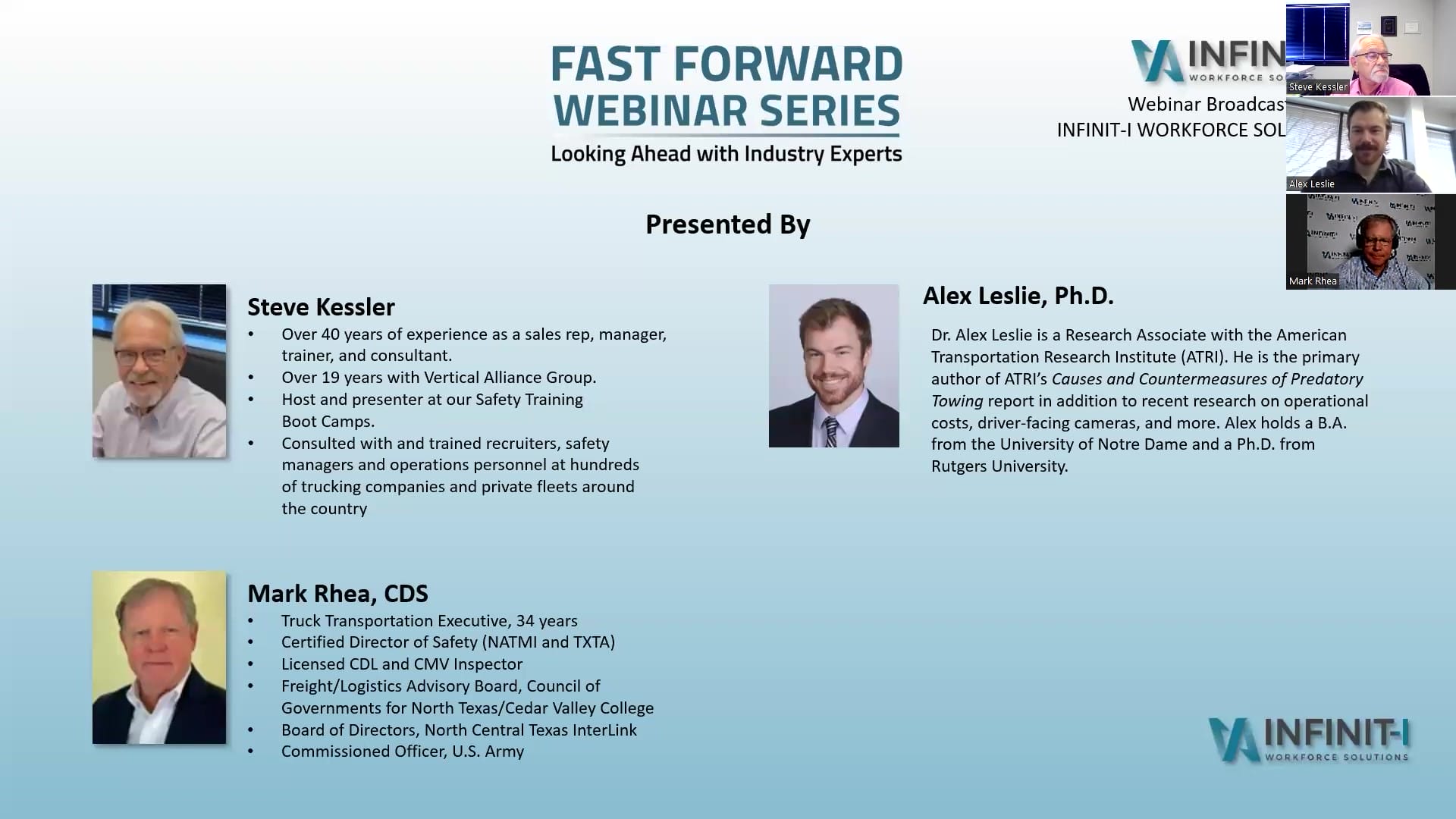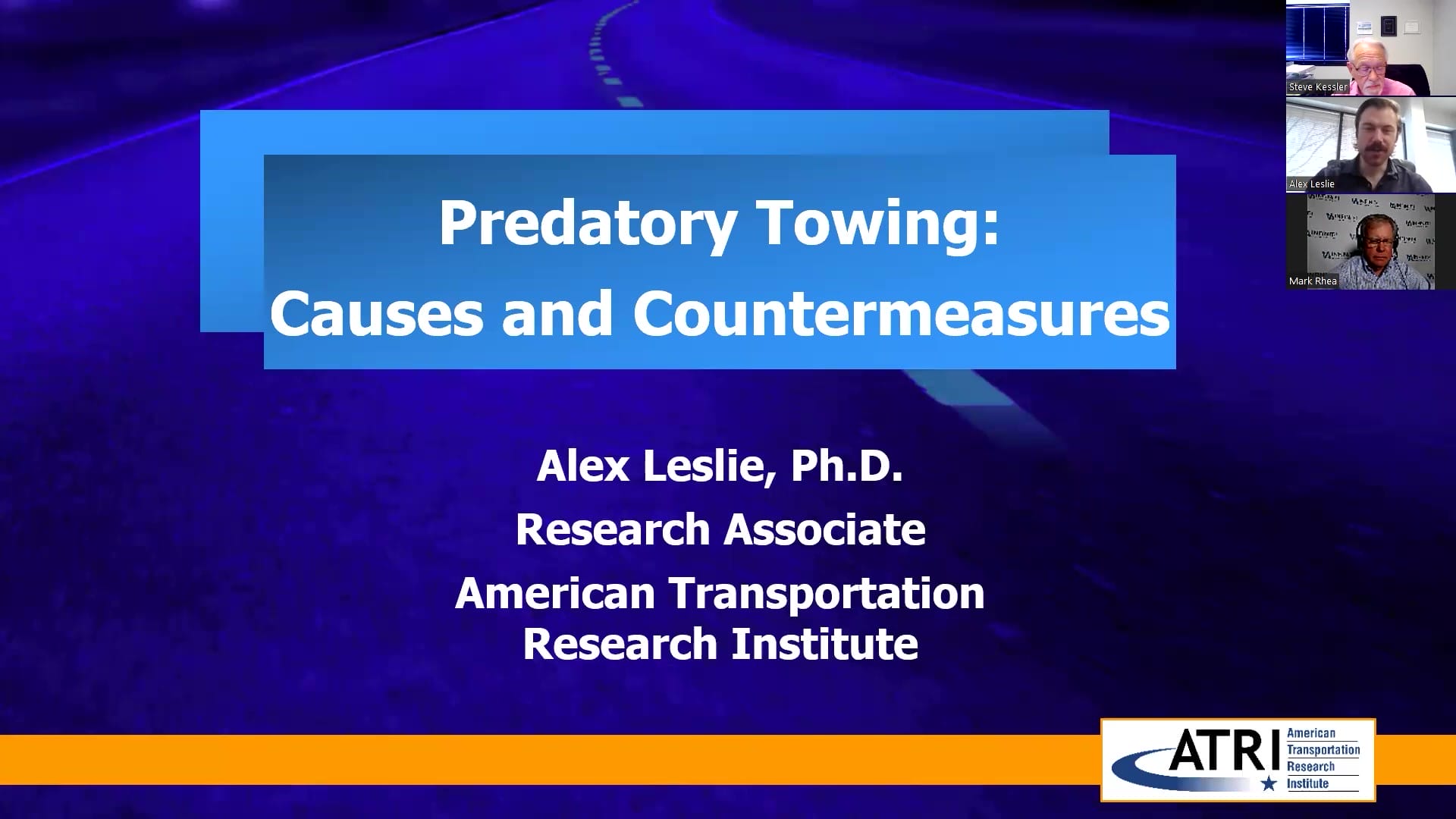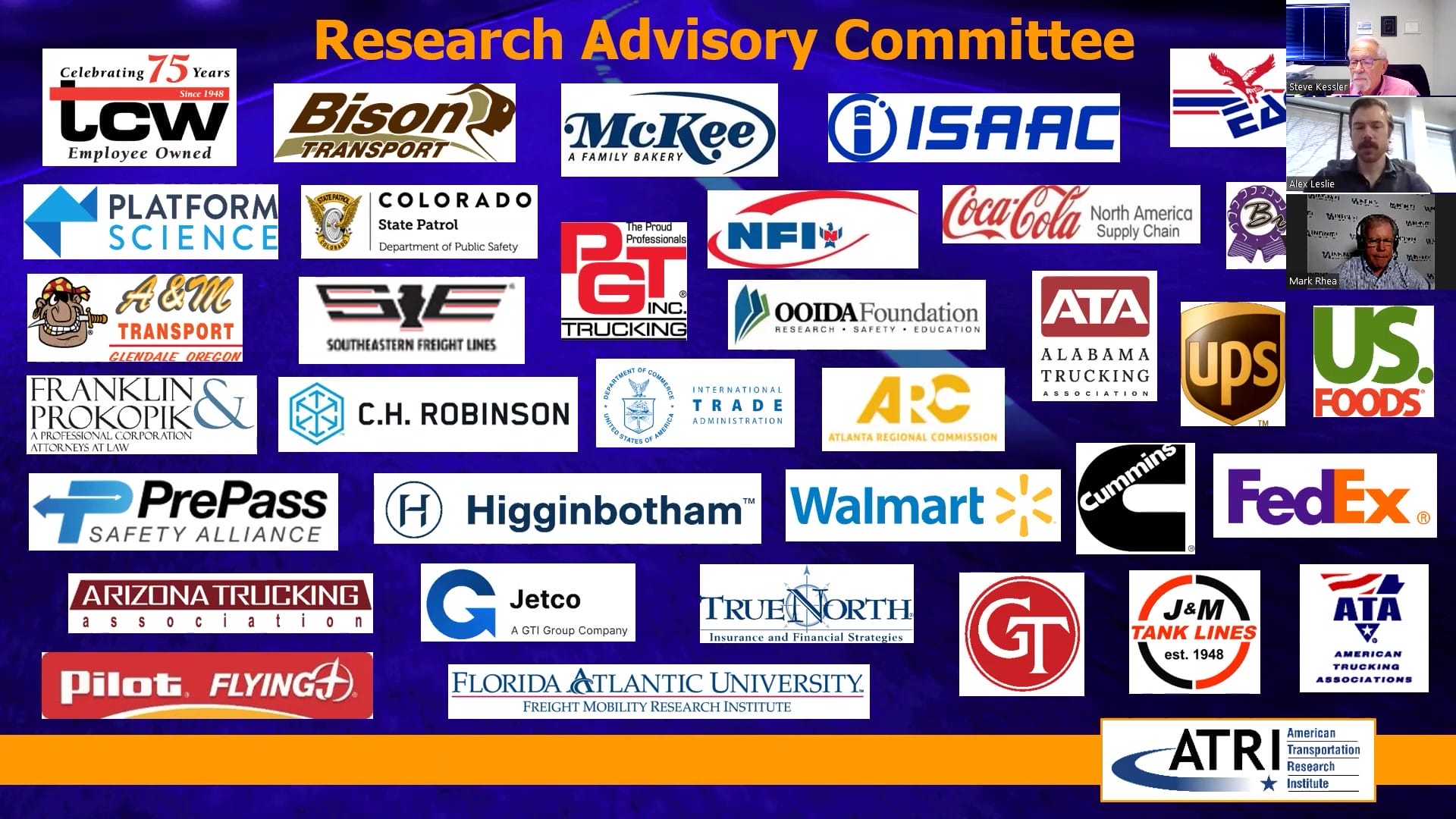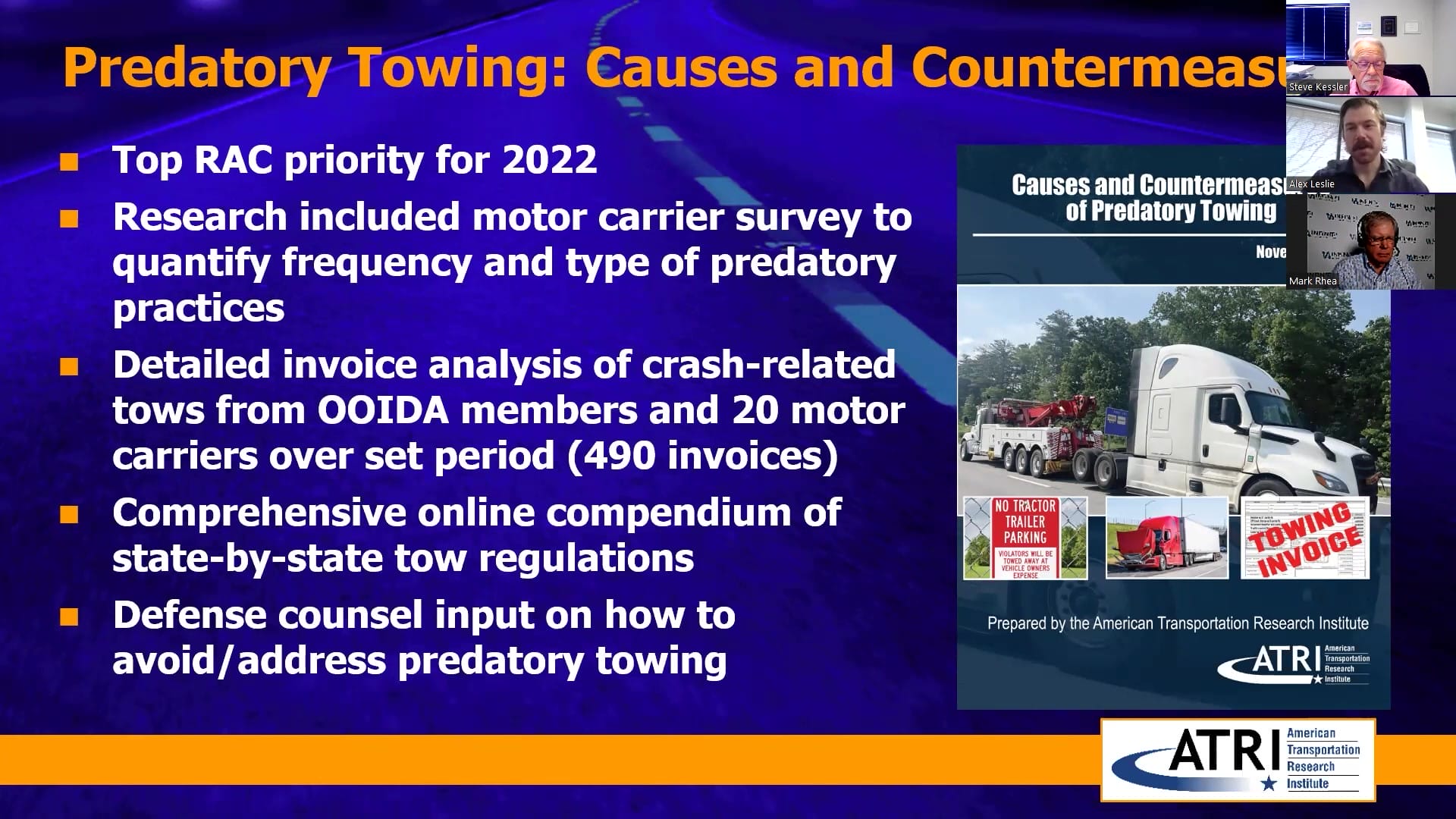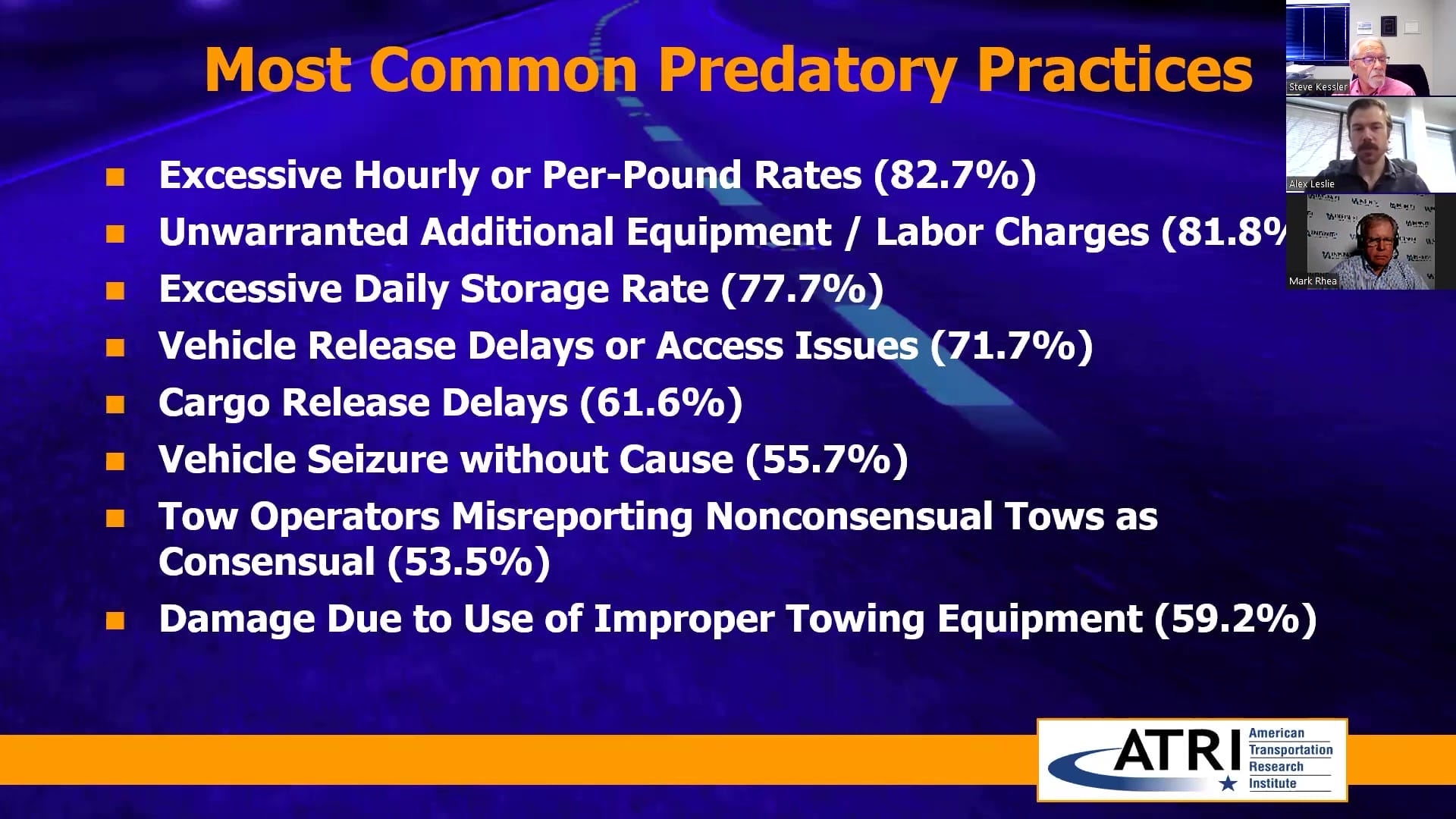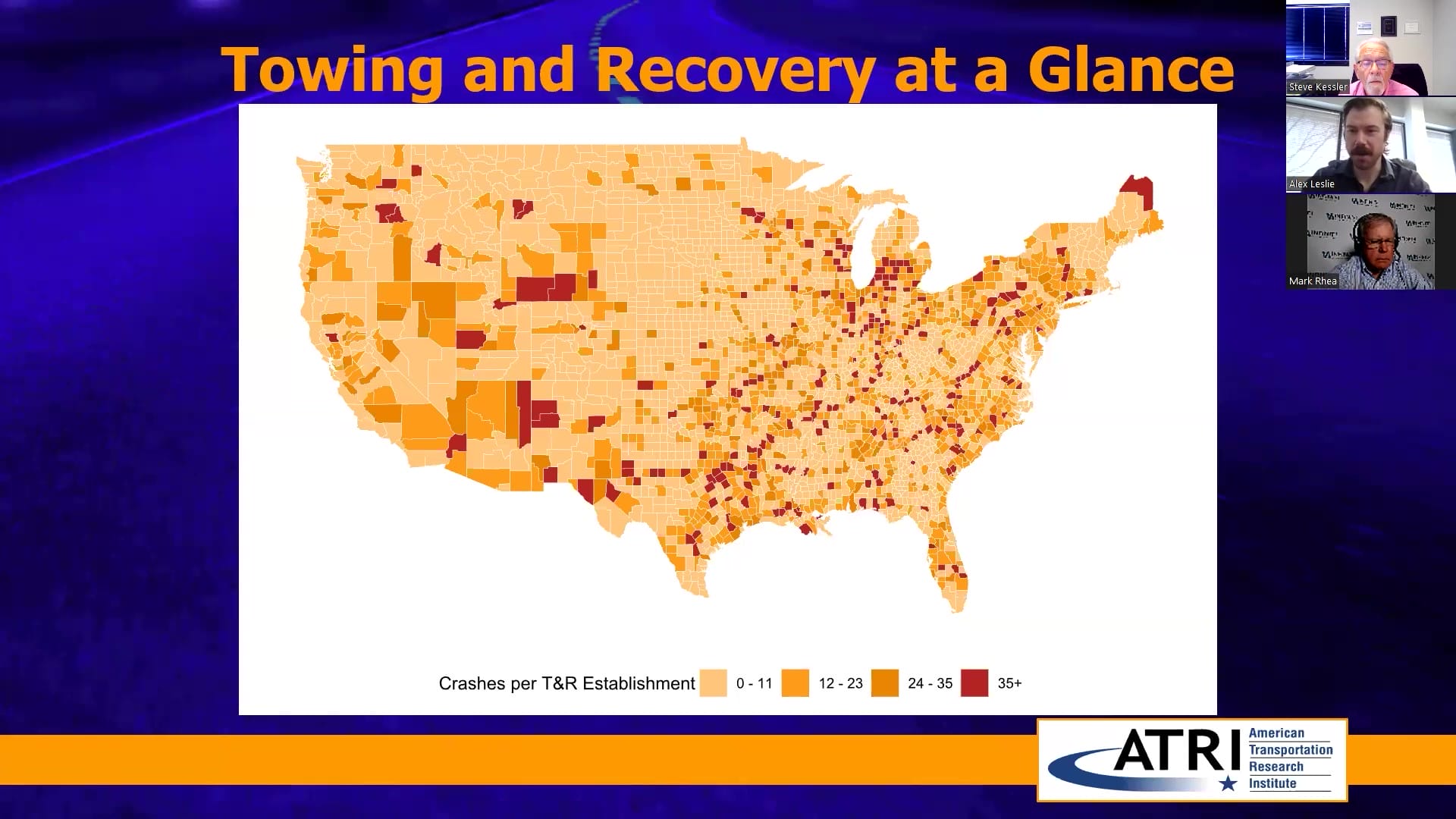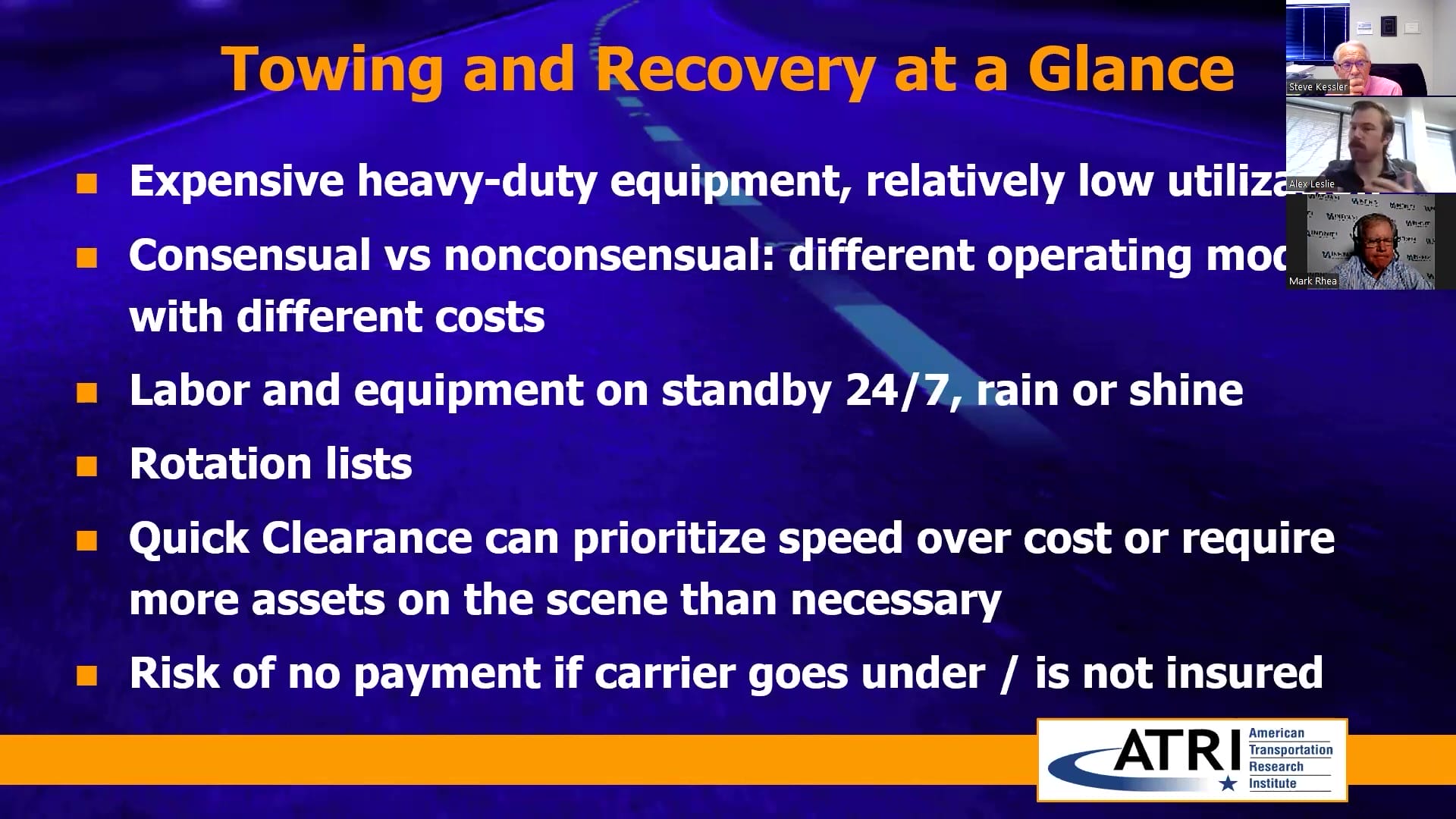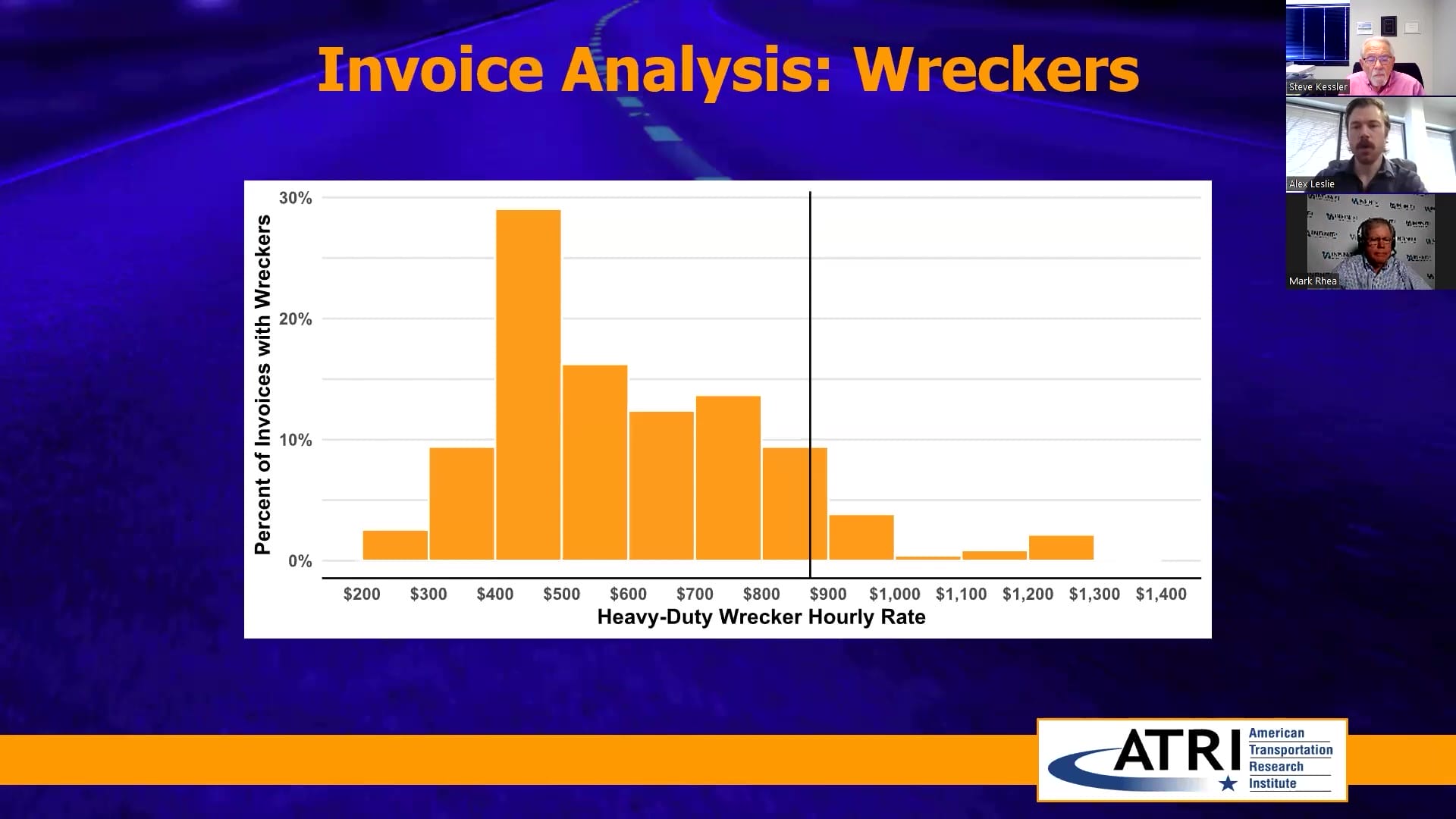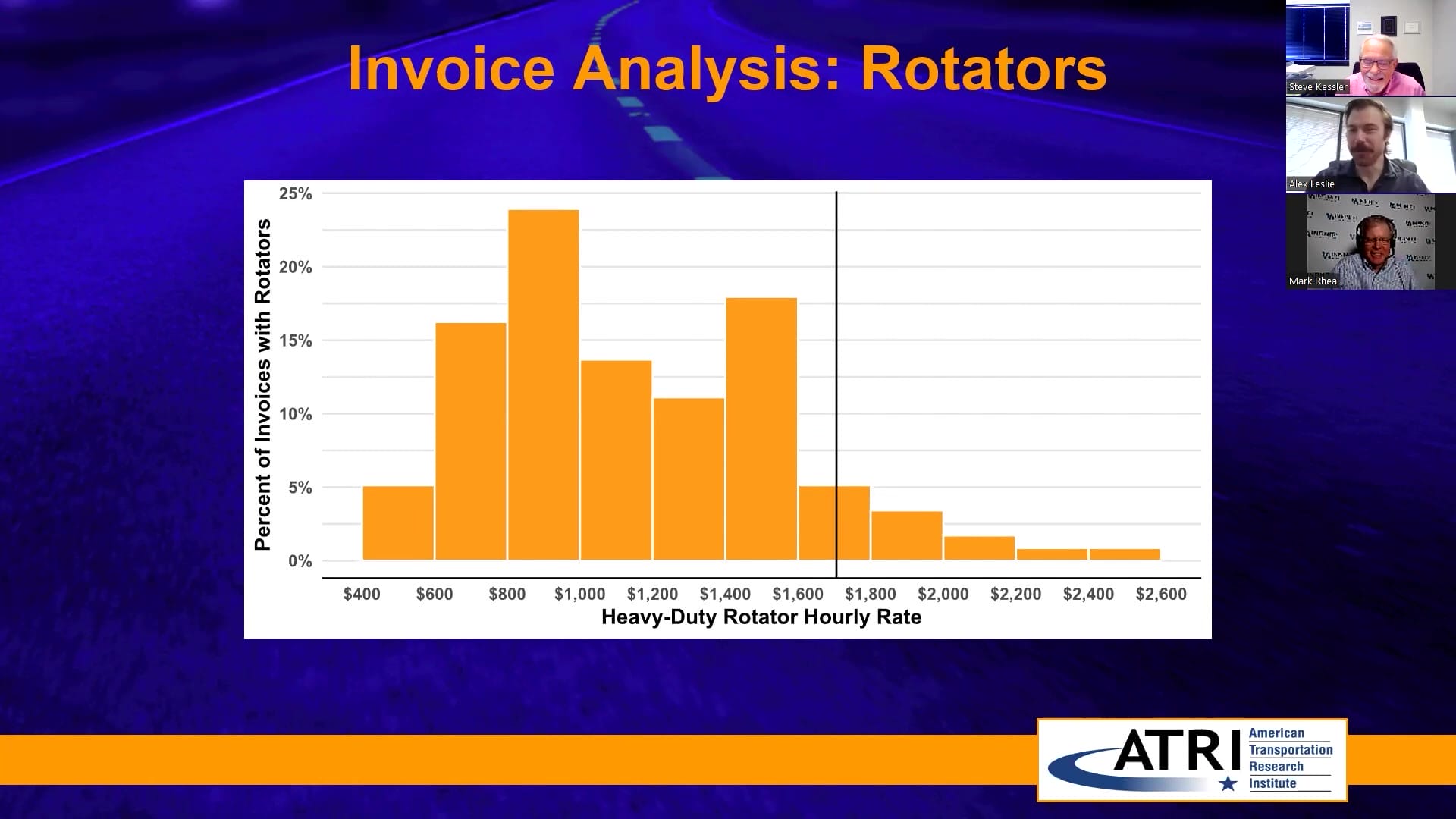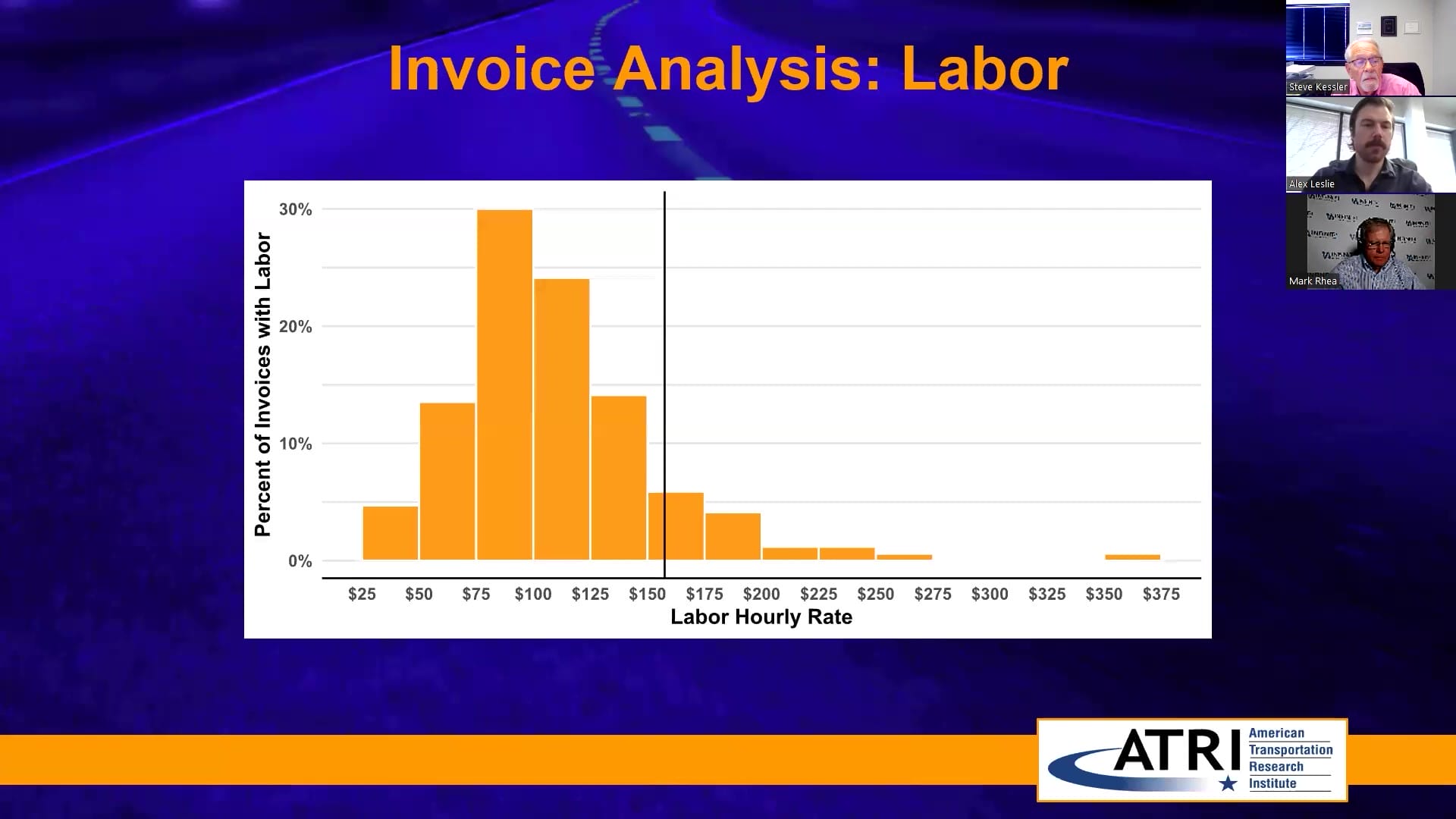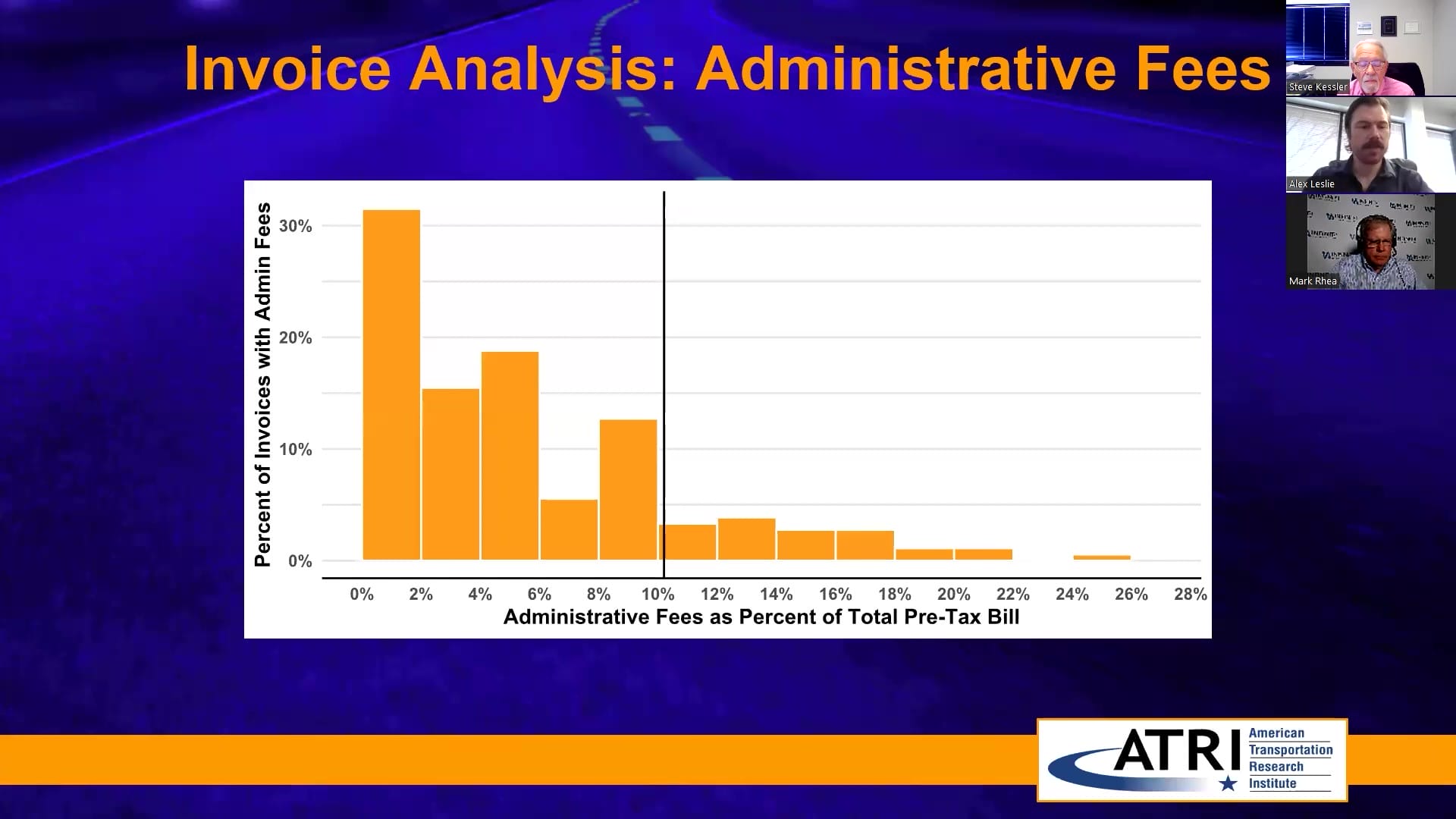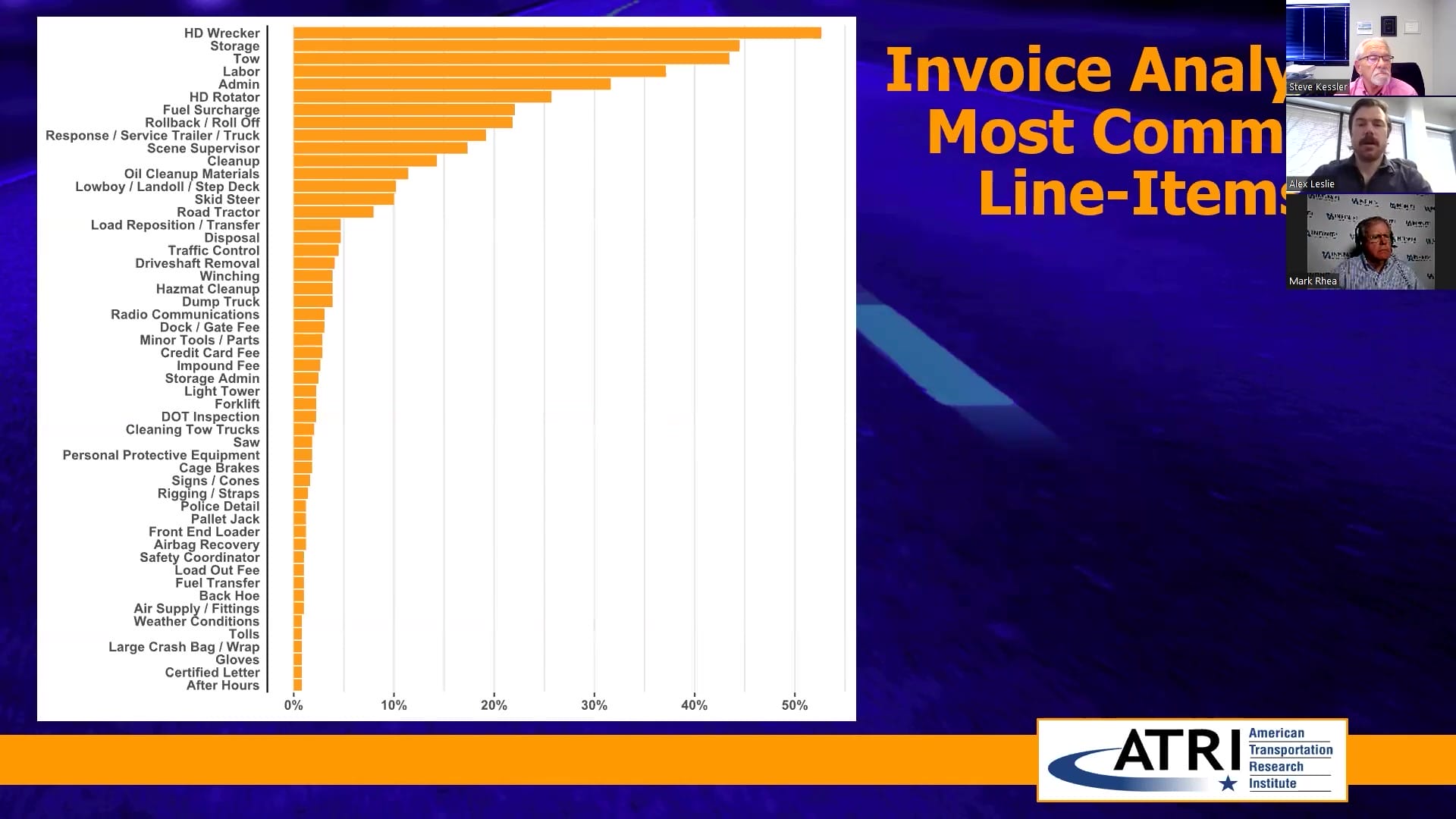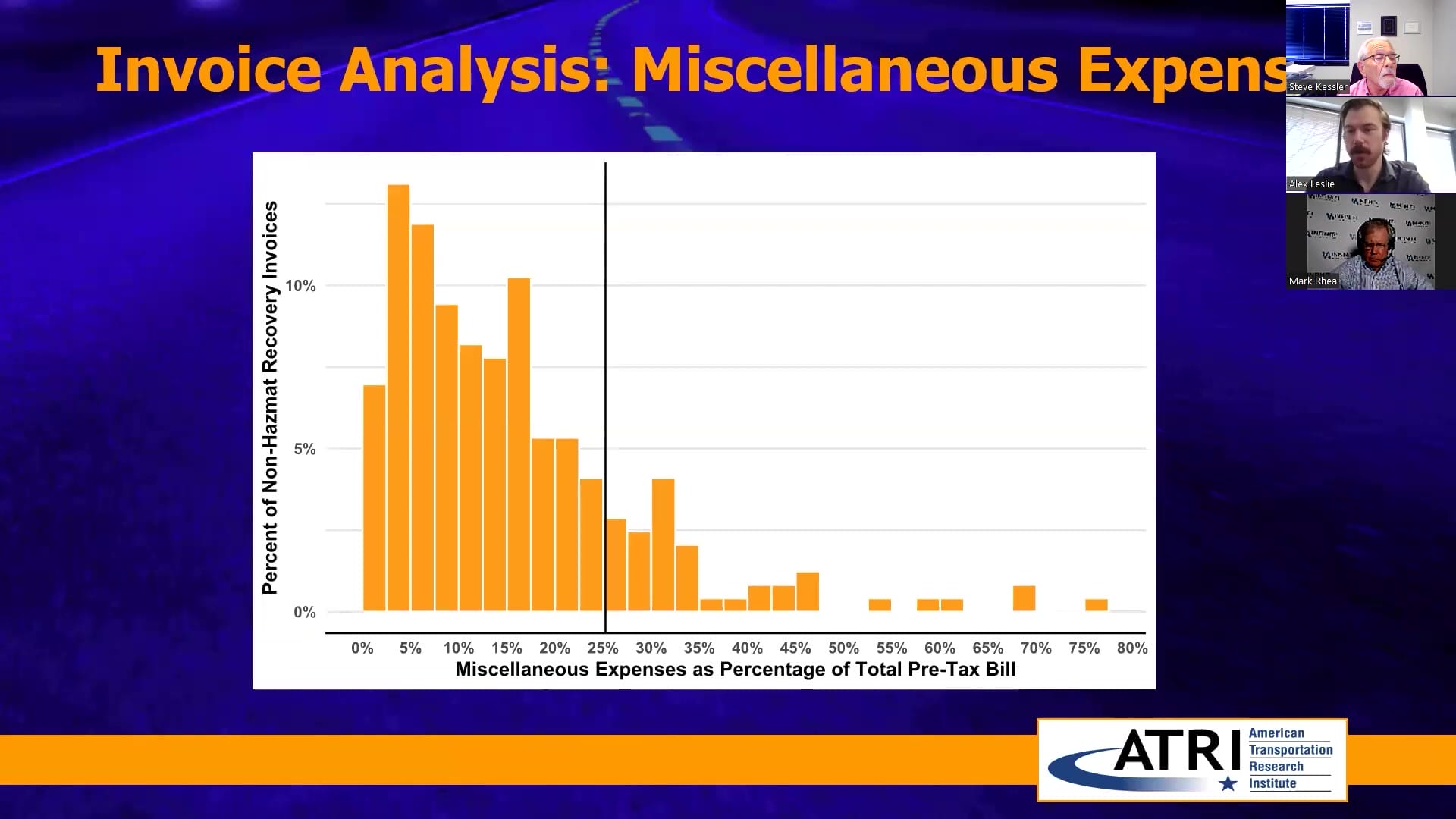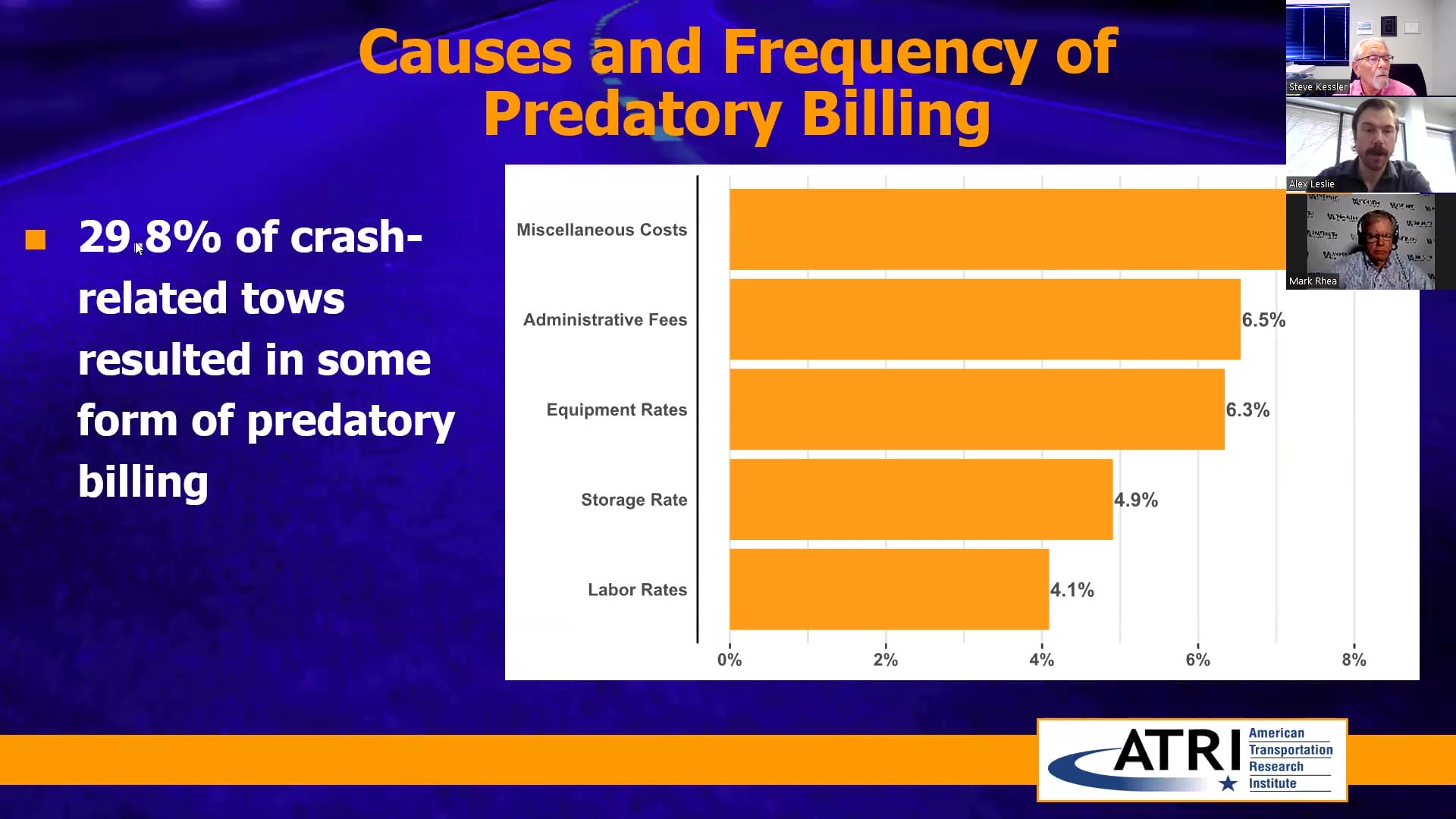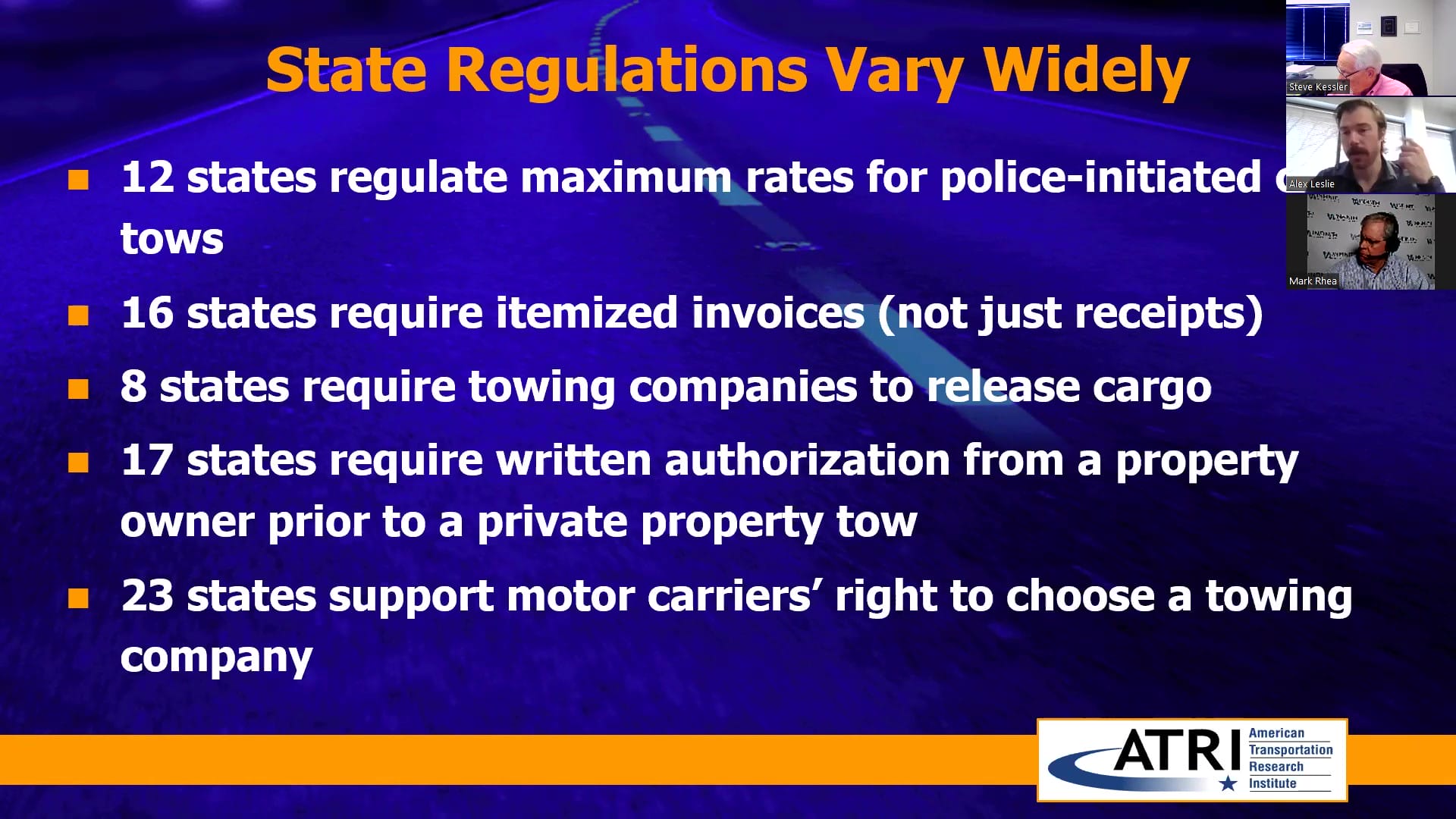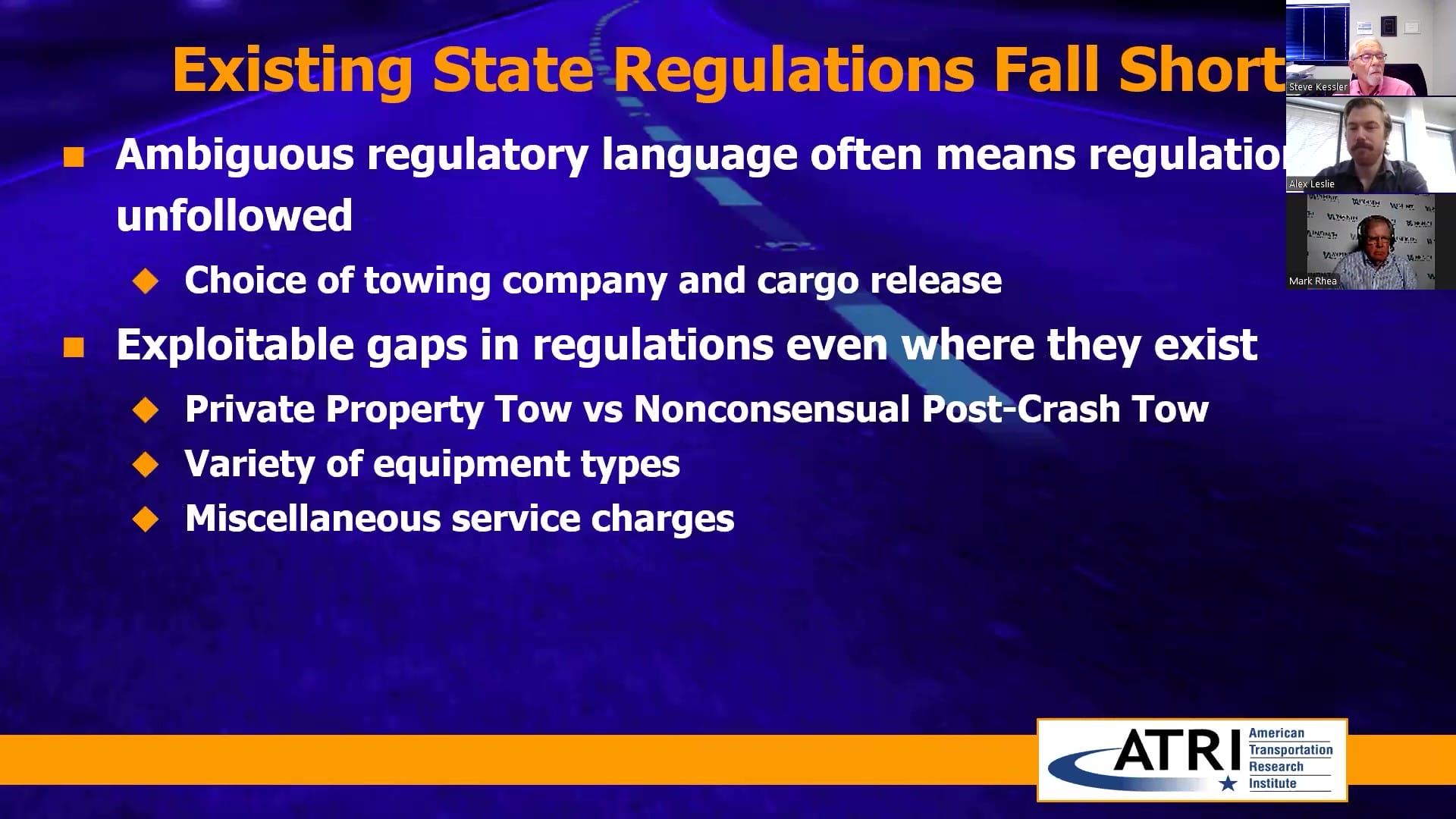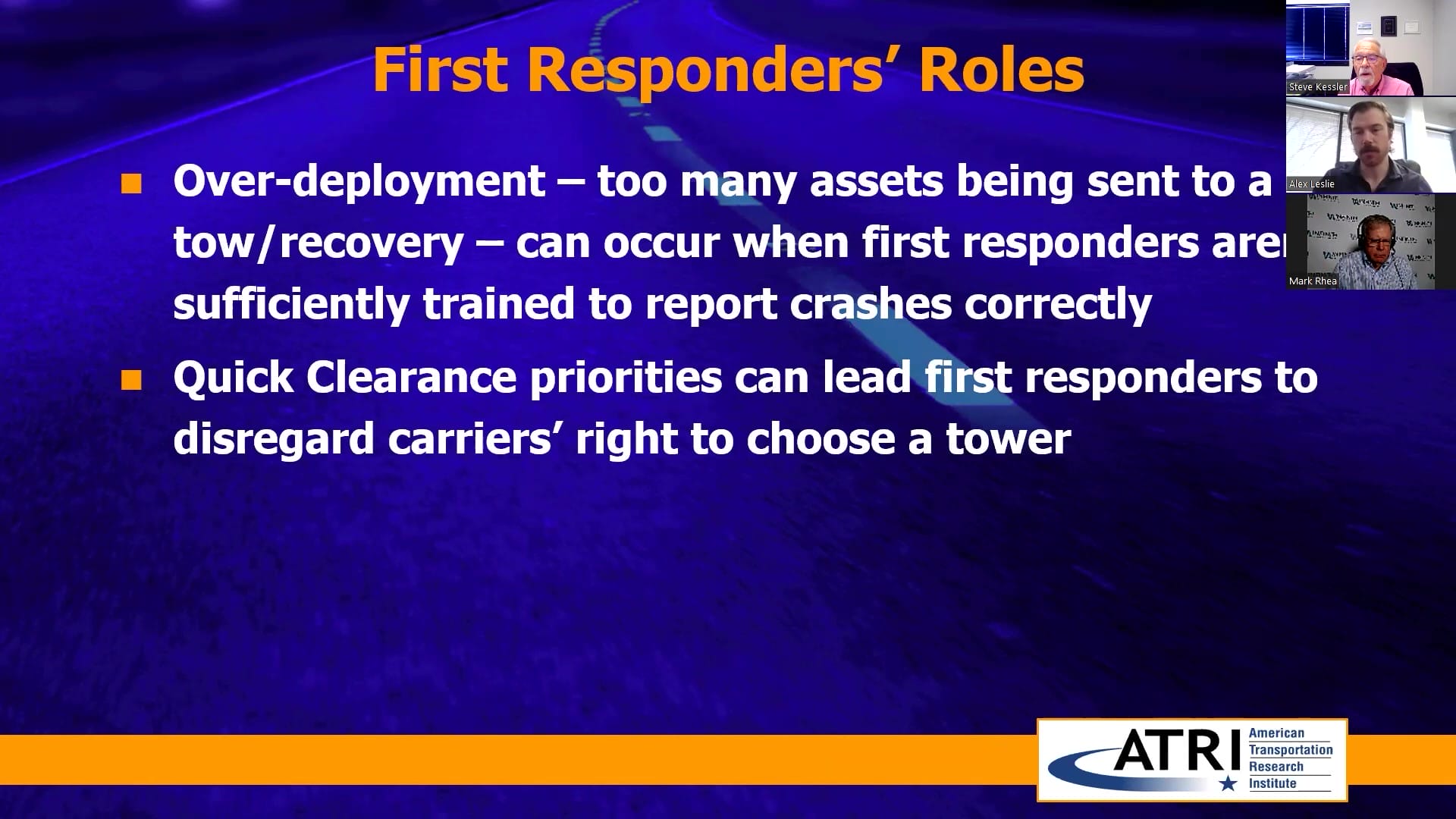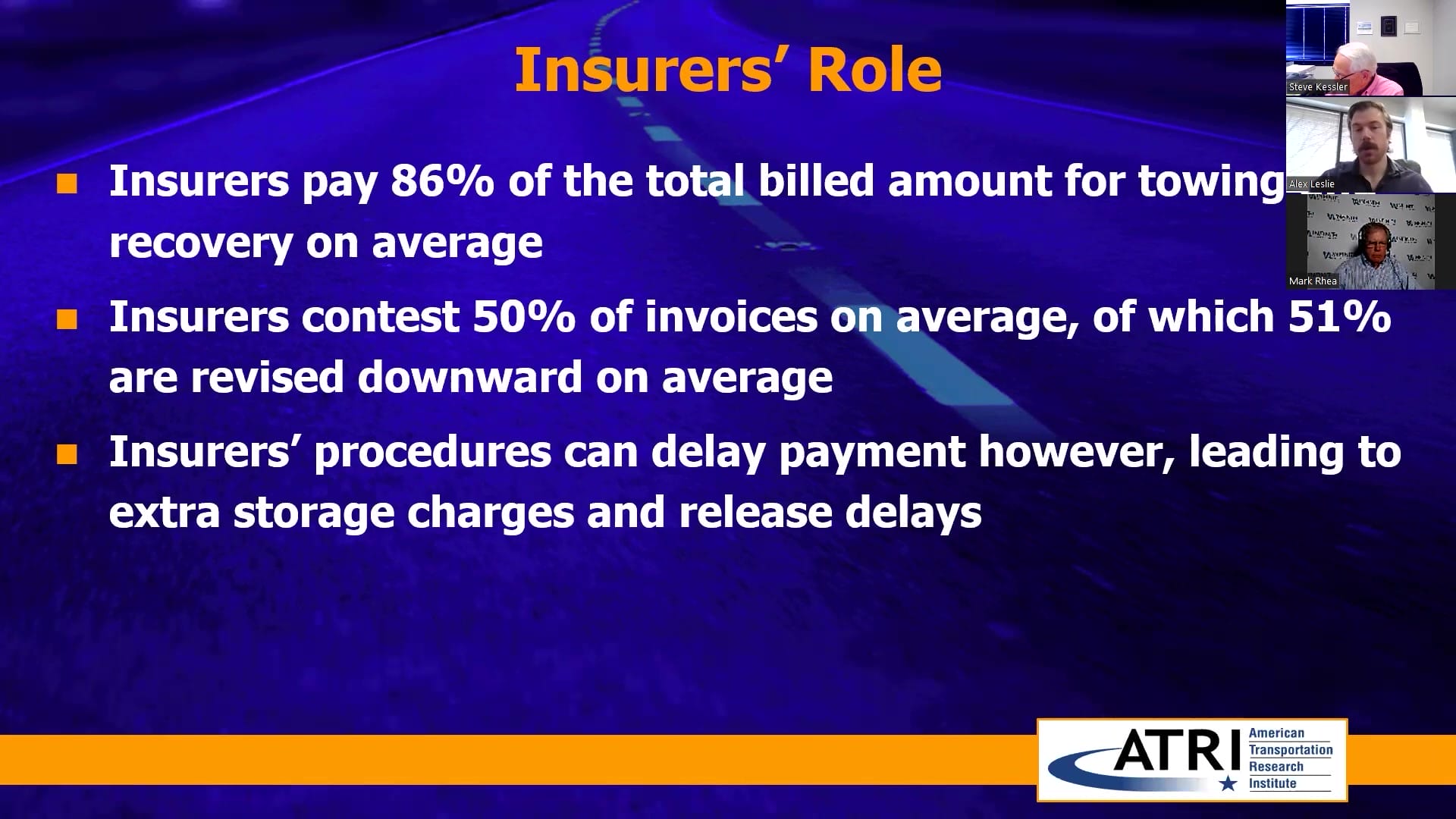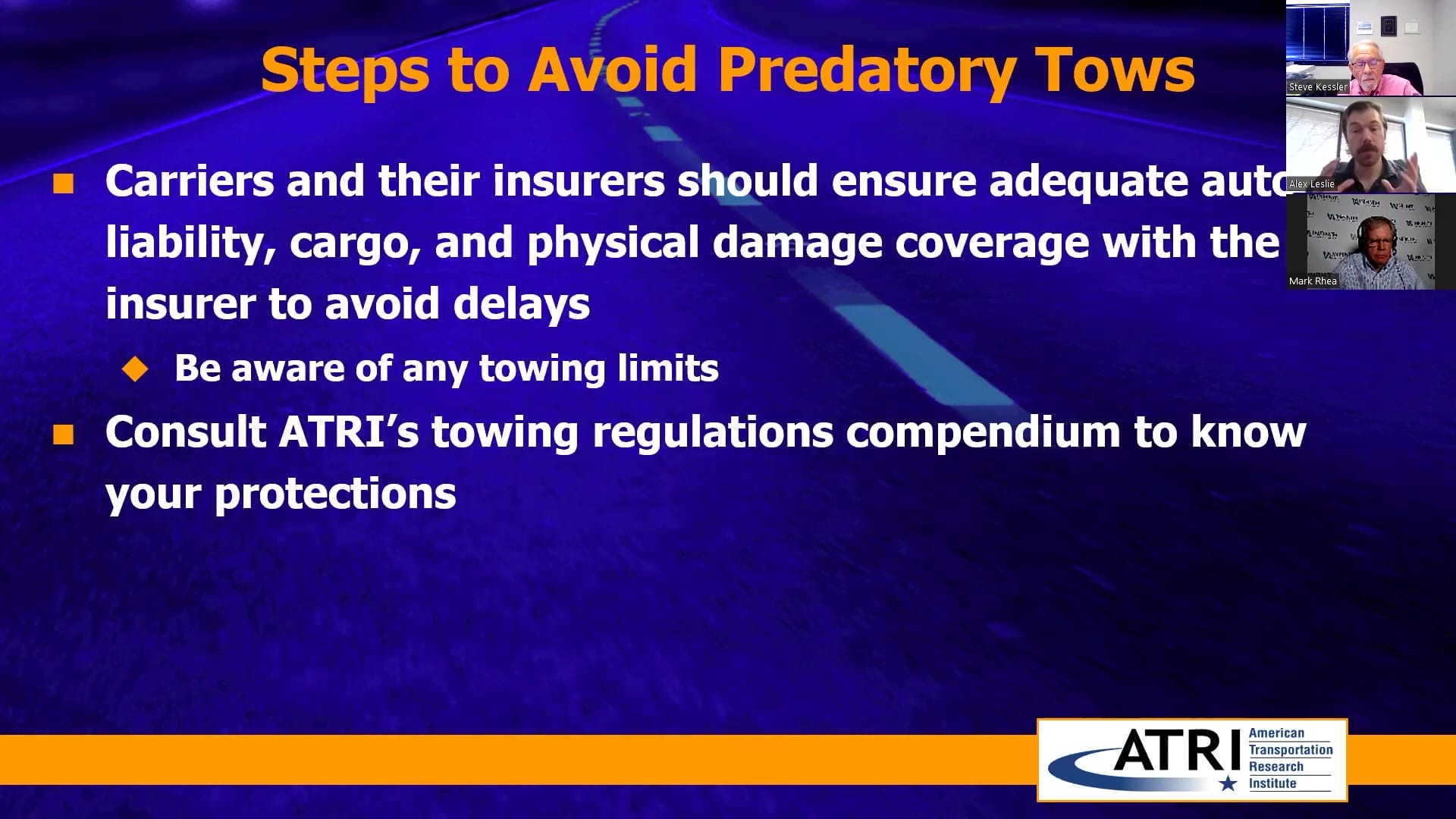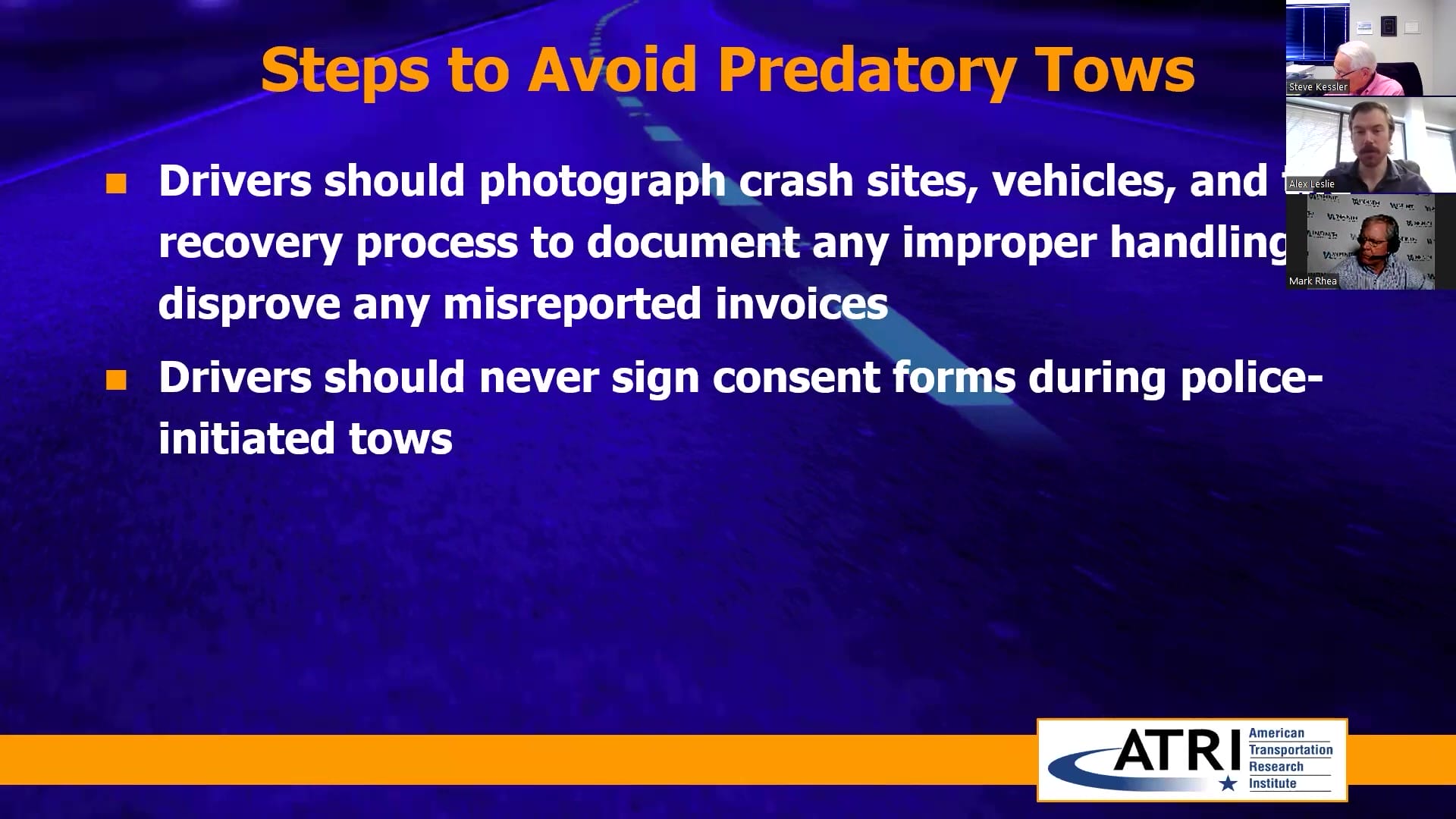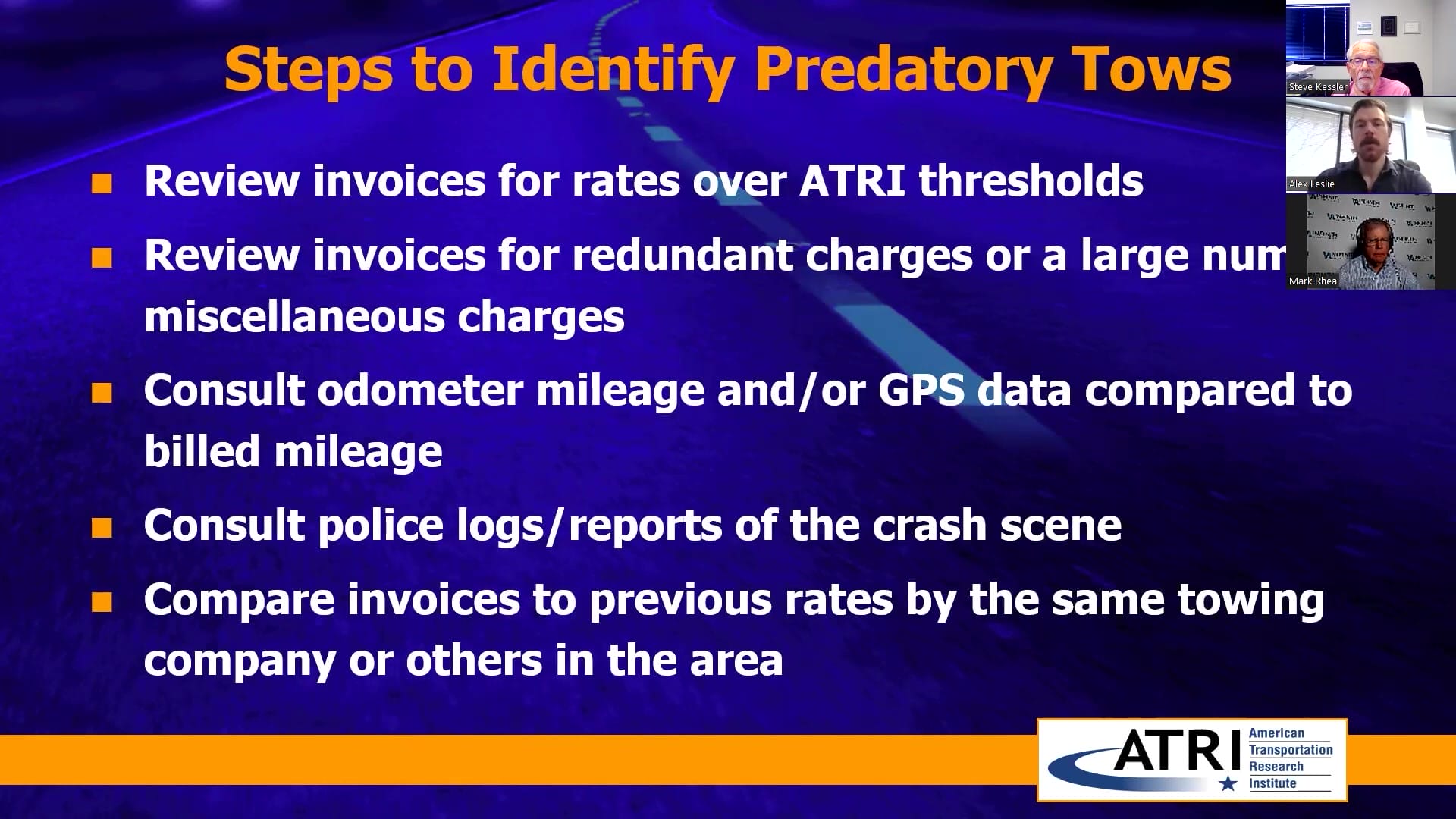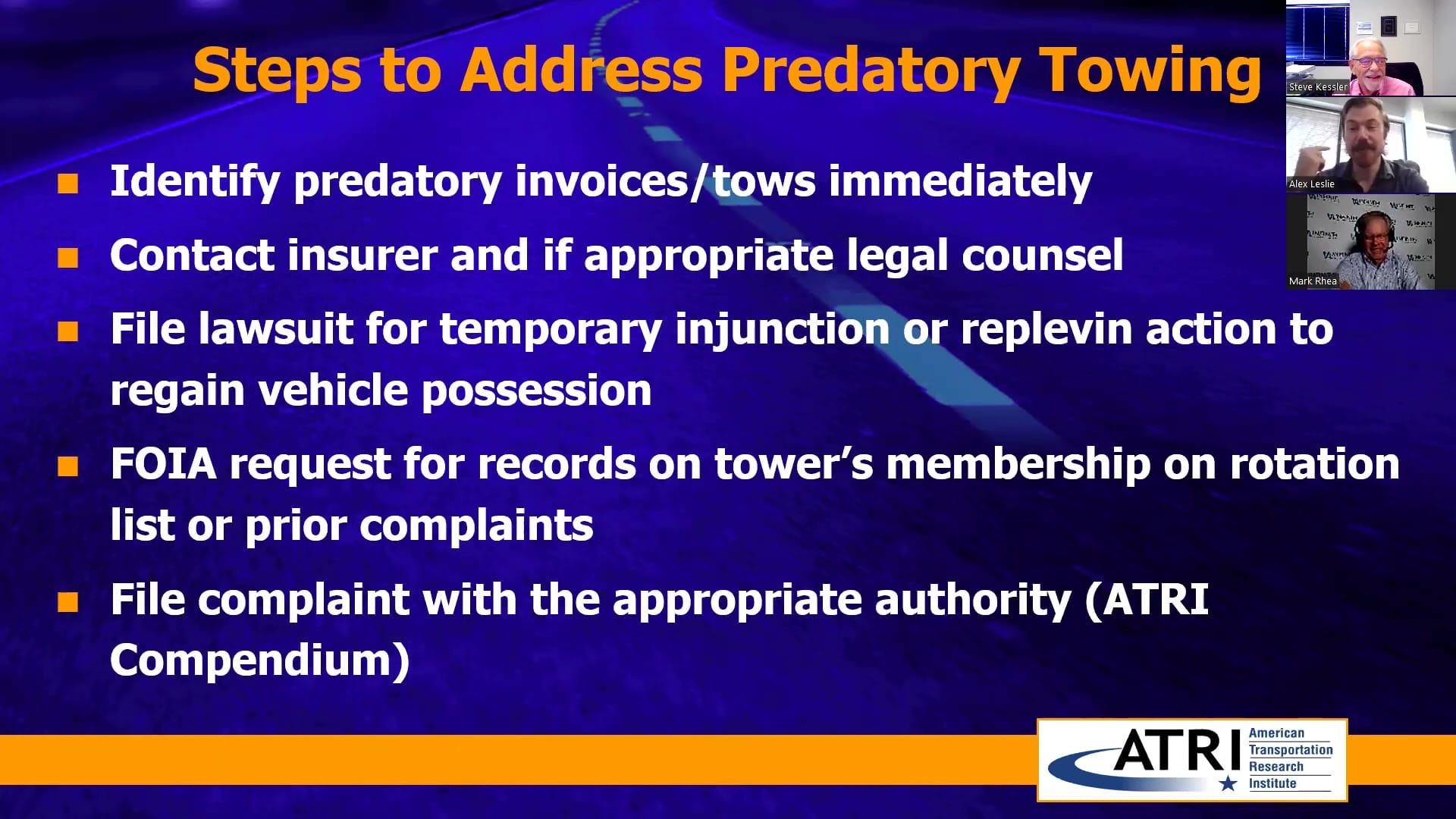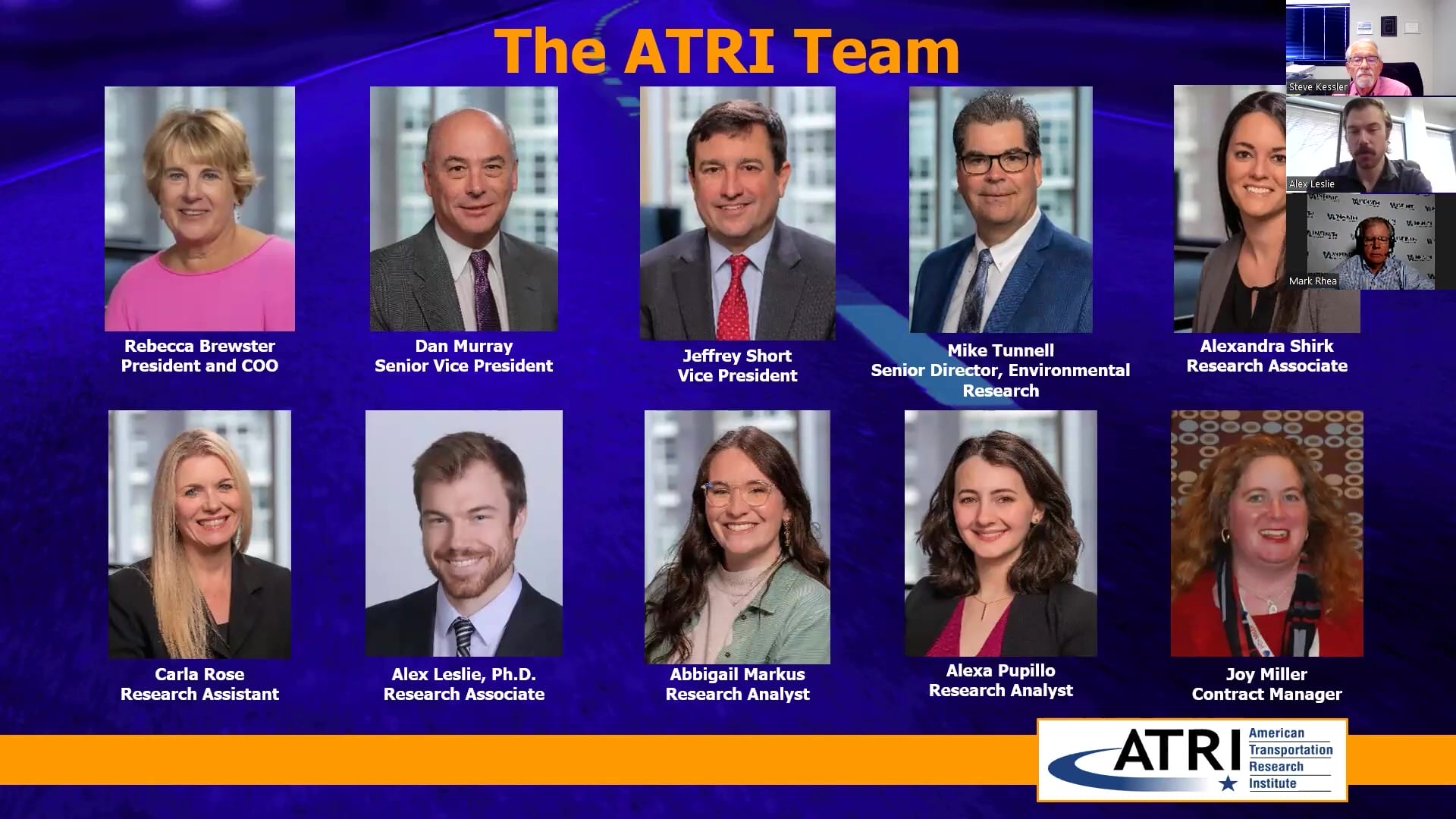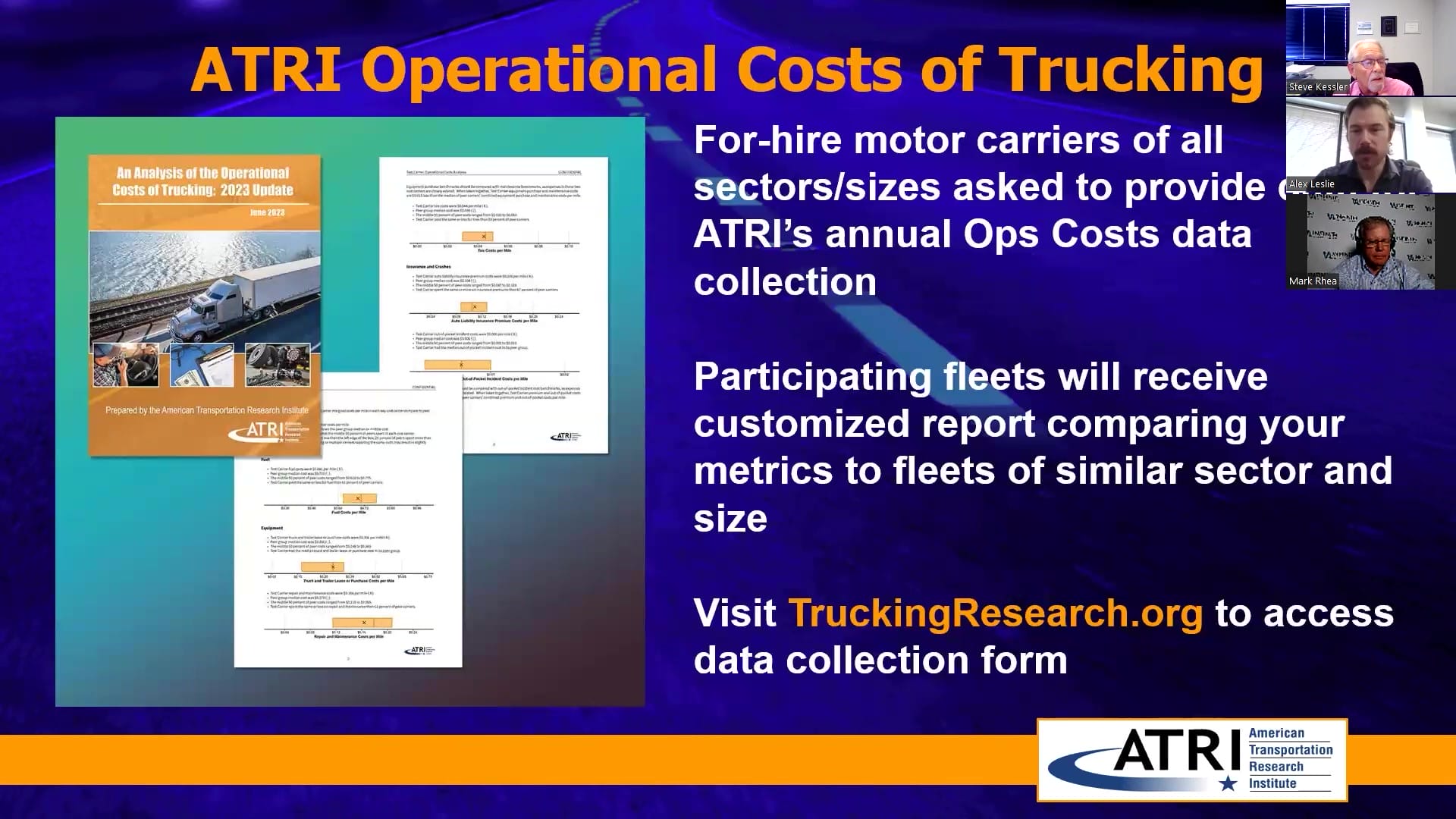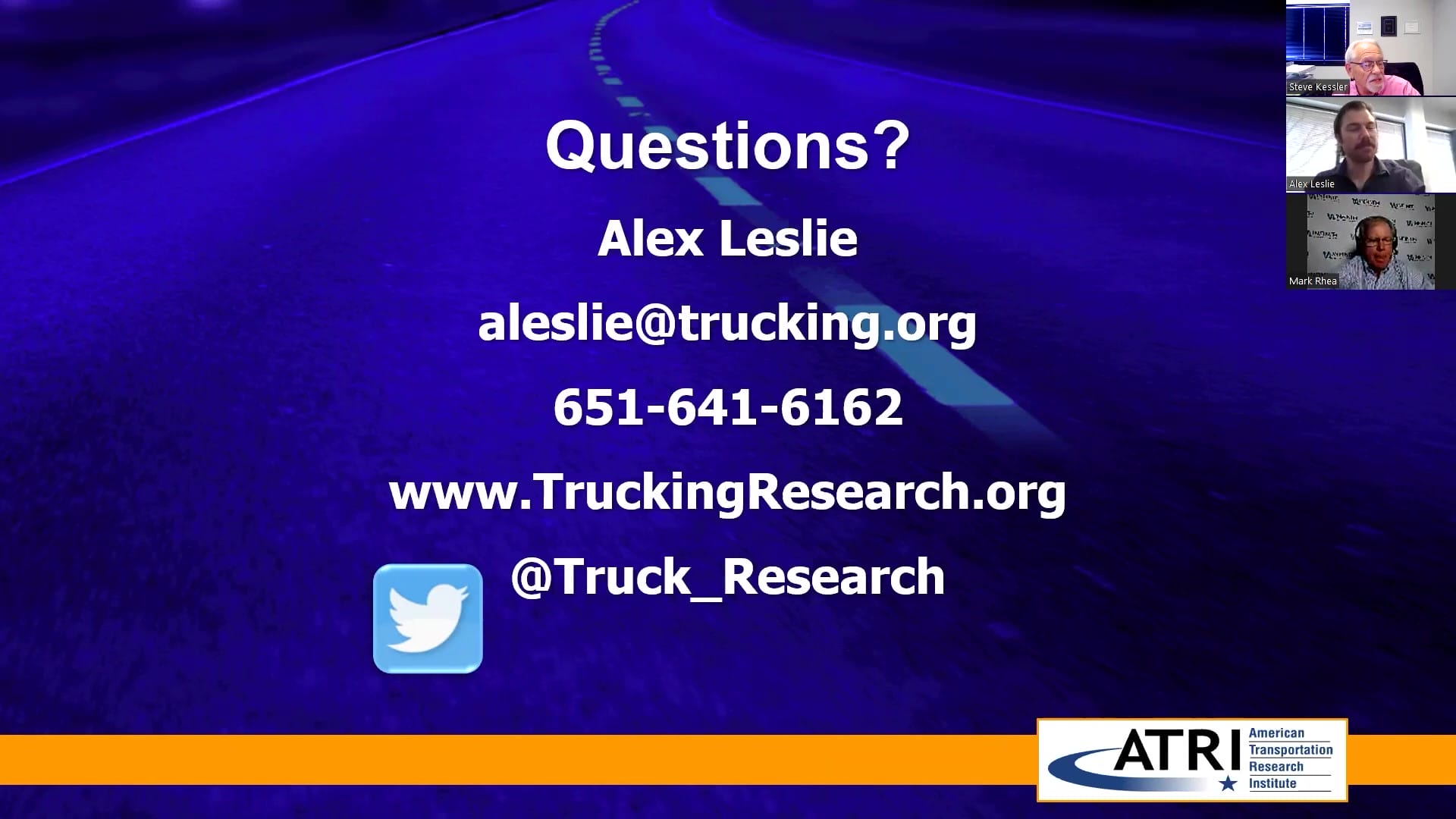Transcription
00:02:10 Steve Kessler
Good morning everybody welcome to the Infinit-I Fast Forward Webinar Series. Appreciate you all taking some time to join us this morning. My name is Steve Kessler. I’m the manager of Marketing event manager here at Vertical Alliance Group and I’ll be the host on the program
00:02:29 Steve Kessler
today.
00:02:30 Steve Kessler
We have a really important topic to talk about today and I suspect some of you have had experiences with predatory towing certainly it’s been something that’s been in the news some lately I’ve seen some articles written about it very recently.
00:02:49 Steve Kessler
So, we’re going to talk about predatory towing causes and countermeasures, and we have a representative from the American Transportation Research Institute that’s going to join us today. I also want to introduce my cohost, Mark Rhea.
00:03:08 Steve Kessler
Many of you I believe that have joined our webinars before know who Mark is. Marks is an industry trucking executive veteran I think better than 35 years of experience as an executive in that industry.
00:03:25 Steve Kessler
So, Mark why don’t you give us your thoughts about predatory towing before we get started here.
00:03:33 Mark Rhea
Well yes good morning, everyone and first of all I’d like to thank ATRI for taking this issue up because it is a real issue uh you know
00:03:43 Mark Rhea
uh it is it’s a punch in the gut uh from a bad situation a truck crash and you’ve got you know possibly people hurt, you’ve got damage just a cargo, you got truck and trailer, and then you get hit with and ridiculous wrecker fee and it’s really compounds the issue
00:04:04 Mark Rhea
and I’m really glad that ATRI is taking this up I’m really looking forward to uh to Alex ‘s presentation
00:04:12 Mark Rhea
and
00:04:13 Mark Rhea
it’s a really helpless feeling when that happens to you, I can tell you for a fact so we’re really looking forward to today. The causes and countermeasures, I’m really interested in the countermeasures, so I think I know what causes of predatory towing but the countermeasures is going to be a great discussion look forward to
00:04:34 Mark Rhea
today’s webinar
00:04:36 Steve Kessler
yeah, and thanks Mark and before I introduce Alex our guest if you feel that you’d like to hit the chat just let us know who you are and where you’re from and by the way if you have questions during the webinar, you can type those into the chat or use the
00:04:56 Steve Kessler
Q and A box that’s
00:04:59 Steve Kessler
there and we’ll let Alex go through his presentation and then we’ll try to take your questions and get those answered towards the end of the of the webinar today so without any further delay I’d like to introduce you all to doctor Alex Leslie. Alex is a research
00:05:19 Steve Kessler
associate with the ATRI
00:05:22 Steve Kessler
and happy to say he is the primary author of a ATRI’s causes and countermeasures of predatory towing report that some of you may have actually seen I’ve got a copy of it it’s a great bit of information and before I turn it over to Alex, I want everybody to remember that
00:05:45 Steve Kessler
ATRI is a nonprofit organization, and they rely on your information to
00:05:55 Steve Kessler
and your financial support in order to do the great things that they
00:05:59 Steve Kessler
do.
00:06:00 Steve Kessler
So, one last thing, Alex does hold a BA from the university of Notre Dame and a PHD from Rutgers so having said that Alex I’m going to turn it all over to you thank you for joining us this morning.
00:06:14 Alex Leslie
All right, thanks Steve and Mark for having me it’s great to be here really appreciate it and I know this is an issue that that you care about as well so always good to be in good company in that respect.
00:06:30 Alex Leslie
As I’ve said my name is Alex Leslie, I’m a research associate with the American Transportation Research Institute. We are like Steve was saying the not-for-profit arm research arm that is of the trucking industry. We have a board of directors that includes executives from the companies
00:06:50 Alex Leslie
on your screen right now. We’re really grateful for their support well support of others in the industry
00:06:58 Alex Leslie
and we also have a research advisory committee which is made up of representatives from across the trucking industry from motor fleets to insurance,
00:07:13 Alex Leslie
Drivers, lawyers,
00:07:16 Alex Leslie
and different partner industries as well that trucking works with, so these are the folks who help us decide that is they are the ones who decide for us what the key research issues are in the trucking industry each year.
00:07:32 Alex Leslie
We get together each year in March. This actually just happened just a couple weeks ago, and they vote on what the biggest concerns are for the industry. And so, in 2022
00:07:43 Alex Leslie
our research advisory committee got together and said predatory towing is one of the top five biggest issues that we need research on in the trucking industry. This is something that has been a growing concern and again that’s across this group trucking companies but also the companies that do business with trucking.
00:08:02
So
00:08:03 Alex Leslie
that is what gave us the mandate to then go out and begin doing this research on predatory towing to really dig into like the title says there both the causes and the countermeasures because of course we all want to know those countermeasures but if you don’t know the clauses and if you don’t have a good understanding of
00:08:23 Alex Leslie
what you know what is the contributing factors of which there are many it is it’s hard to take a good defense to this problem. So in the course of this report
00:08:38 Alex Leslie
we got data from a number of different sources which I you know I like to highlight at the top here because as Steve was saying we really rely on the trust of the trucking industry to be able to produce the data that you’re about to see.
00:08:52 Alex Leslie
So, we started with a broad survey to motor carriers to try to understand the scope of the question.
00:09:00 Alex Leslie
We followed it up with some really detailed invoice data collection we worked with twenty motor carriers and OOIDA, the Owner-Operator Independent Driver Association to collect about five hundred invoices over a set period of time and that’s really what when we get to the invoice analysis in a bit that’s really what
00:09:20 Alex Leslie
undergirds the reliability of that analysis the rigor that that we have a complete data set of all the crash related towing invoices from those groups in that set time period.
00:09:35 Alex Leslie
We also went through and we did a pretty comprehensive review of what regulations look like from state to state say more about that later on as well and then finally defense council input on how to avoid or address predatory towing and I can add to that too we spoke with a lot of insurers and did some data collection there as well.
00:09:56 Alex Leslie
So that’s sort of the order that I’ll present this information in a bit of a table of contents if you will
00:10:03 Alex Leslie
but I do want to say first excuse me not first. I’ll just flag right now that we did also speak to towing companies because we really did want to understand their perspectives pressures on their business
00:10:18 Alex Leslie
and what their experience of this issue too
00:10:22 Alex Leslie
and we got a lot of great feedback from them so again we want to be clear this is a real issue but at the same time the majority of the towing industry are you know are good operators they’re doing hard work out there and they’re a necessary part of the trucking industry so I’ll flag that up front
00:10:41 Alex Leslie
and I’ll say a little bit more about that
00:10:44 Alex Leslie
in a second as well here.
00:10:47 Alex Leslie
So first of all again we wanted to know what are the most common types of predatory towing when we talk about predatory towing. What are the things that we’re actually talk
00:10:57 Alex Leslie
and first and foremost. Excessive hourly or per pound rates and when we went out to motor carriers, we found that almost 83% of them had encountered this form of predatory towing at some point on a yearly basis.
00:11:14 Alex Leslie
So that’s pretty significant.
00:11:16 Alex Leslie
The next most common there is unwarranted additional equipment or labor charges clocking out a bit over 81%
00:11:24 Alex Leslie
Excessive daily storage rate 77.7%.
00:11:29 Alex Leslie
Vehicle release delays for access issues
00:11:33 Alex Leslie
so again that’s when companies not able to get that truck back 71.7%of motor carriers said they had encountered this on a yearly basis.
00:11:47 Alex Leslie
Cargo release delays happened about 61.6%
00:11:52 Alex Leslie
among carriers so that’s cases where it’s not just the truck but it’s actually again the cargo that is being held and those are really two separate issues. A lot of the times when a tower is holding on to a truck it’s you know to ensure that they’re getting paid they’re waiting to
00:12:12 Alex Leslie
you know ensure that they have some kind of asset to ensure that they’re going to get paid. Cargo is a bit of a different question because that is again that is the property of the shipper.
00:12:24 Alex Leslie
So, it does open up a different can of worms their. Vehicle seizure without claws came in at about 55.7% of fleets encountering that.
00:12:38 Alex Leslie
This one gets a lot of press. Often, we see cases where you know in the news a truck has been you know towed without the property owner’s authority or maybe from a spot where they were legally parked to
00:12:55 Alex Leslie
Begin with and
00:12:56 Alex Leslie
so, this is a big issue we see in the news it wasn’t the most common issue encountered but again 55.7% still pretty frequent more than half of carriers we’re seeing this in an average year.
00:13:13 Alex Leslie
The last couple here tow operators misreporting nonconsensual tows as consensual. OK so a lot of the items in this list are pretty straightforward explicit this one is a little bit less though and one of the reasons why this matters so much is that in the states where there are towing regulations
00:13:33 Alex Leslie
a lot of them hinge on whether a tow is consensual or not they protect a motor carrier if it’s a nonconsensual tow.
00:13:42 Alex Leslie
But if it’s a consensual tow regulation don’t apply because they assume that that market dynamics will work out those prices and so that can become an issue and I will say a little bit about how you can avoid that during this presentation.
00:14:01 Alex Leslie
And then finally damage due to use of improper towing equipment improper technique.
00:14:08 Alex Leslie
You know this can often happen when a tower is on a rotation list when they don’t really have the
00:14:15 Alex Leslie
the equipment to carry out heavy duty tows.
00:14:24 Alex Leslie
All right so now that we have a bit of a sense of those issues I’m going to step back and I’m going to say a little bit about the towing and recovery industry at a glance because like I just said a few minutes ago. They do have some unique pressures and it is worth recognizing that acknowledging that.
00:14:43 Alex Leslie
You know being fair to our peers in the towing and recovery industry.
00:14:48 Alex Leslie
So, this map that you have here is an approximation of the number of crashes per towing and recovery establishment by county.
00:14:58 Alex Leslie
So, these are FMCSA recorded crashes and make this data and then the
00:15:06 Alex Leslie
federal government tracks a number of different establishments by county, and it does have data for towing establishments.
00:15:15 Alex Leslie
So, I should say here that these are heavy duty crashes but not every single towing establishment
00:15:22 Alex Leslie
included on this map is going to have heavy duty equipment, a lot of them, a lot of them don’t. So, in fact
00:15:31 Alex Leslie
the
00:15:32 Alex Leslie
that crashes per towing and recovery establishment is slightly different but this is an estimate here and the big takeaway from this method is that in a lot of the counties in the US in a lot of areas in the country.
00:15:49 Alex Leslie
There’s only on average maybe one heavy duty crash that requires a tow
00:15:58 Alex Leslie
per month per year.
00:16:02 Alex Leslie
and that’s just not a lot of heavy-duty crashes right I mean there are areas where you know especially urban areas where crashes are more frequent and you know towing companies are getting more business but for the most part
00:16:14 Alex Leslie
the really heavy-duty towing equipment you know those 50-ton rotators 75-ton rotators
00:16:22 Alex Leslie
those are not
00:16:23 Alex Leslie
getting a lot of utilization in a lot of markets
00:16:27 Alex Leslie
and that is a real cost pressure on doing business in the towing and recovery industry on the heavy-duty side.
00:16:35 Alex Leslie
A few more things that again just useful to keep in mind as the context
00:16:40 Alex Leslie
to understand what pressures the towing industry has because some of the some of this is a communication issue that we see sometimes. Like I said expensive equipment with relatively low utilization you also have consensual versus nonconsensual those are pretty different operating models
00:16:59 Alex Leslie
and they can have different costs right. Consensual tows you’re getting the call you know breakdowns on the side of the road you know those are towing companies that that maybe have relationships with the motor carrier you know hey
00:17:14 Alex Leslie
motor carrier operating on this lane regularly they’re going to reach out they’re going to make a business relationship with a tower there. They’re going to establish like a good healthy relationship there.
00:17:24 Alex Leslie
Nonconsensual though that’s much more irregular business you’re relying on being on a rotation list.
00:17:31 Alex Leslie
You’re working with first responders there are extra you know parts involved extra people you got to communicate extra parties that you’re doing business with
00:17:41 Alex Leslie
and you know again you don’t have the same level of reliability so it’s a different operating model the costs do look different there.
00:17:51 Alex Leslie
Of course, we hear this often from towing companies that they’re on standby 24/7 rain or shine so that is certainly costs they have to incur.
00:18:01 Alex Leslie
Rotation lists are a big factor. These are the lists that are kept at the local level often by the police jurisdiction, whether that’s metropolitan, whether that’s highway patrol, and that’s the list of towing and recovery companies that they’re going to send out in the case
00:18:21 Alex Leslie
of a crash where the roadway needs to get cleared.
00:18:25 Alex Leslie
Now depending on your jurisdiction
00:18:28 Alex Leslie
the standards for joining rotation list can be very different. In some jurisdictions the standards might not really exist you know in some jurisdictions it may be more of who you know rather than
00:18:42 Alex Leslie
what you know
00:18:43 Alex Leslie
and finally in some jurisdictions there isn’t a clear policy for taking a tower off
00:18:51 Alex Leslie
that rotation list if they have had some kind of predatory complaint lodged against them.
00:18:58 Alex Leslie
And finally, like you saw in that map in some jurisdictions they might have to stay on the rotation list because there just might not be enough other heavy-duty towers operating in the area so that’s a big question mark and again when we talked to towing companies’ rotation lists are something that they often have beef with as well. So, you know a lot of these issues
00:19:18 Alex Leslie
towers a lot of them that are running by the book they are they are right with the trucking industry in their complaints about some of these practices.
00:19:30 Alex Leslie
Which is a great lead into quick clearance. In some jurisdictions you have a really high priority set by law enforcement on getting that road clear as quickly as possible
00:19:44 Alex Leslie
and that’s an understandable goal of course we need safe navigable roadways.
00:19:51 Alex Leslie
But there is a fine line and in some cases it can require that towers have more assets on the scene
00:20:00 Alex Leslie
than necessary
00:20:02 Alex Leslie
and if that’s the case they’re going to have to charge trucking companies for those assets. So, there are situations where you know you have to send out as a as a towing company
00:20:14 Alex Leslie
two wreckers to a crash that may be only requires one
00:20:18 Alex Leslie
but it’s in the regulations because of quick clearance.
00:20:23 Alex Leslie
And then finally this is one that that you know again is a concern that the towing industry has if a carrier goes under, if they’re not insured they’re kind of stuck holding the bill on that so that’s a big reason why certainly they have a preference for holding onto equipment until a invoices is paid.
00:20:44 Alex Leslie
All right so I’ve made my caveats so I’ve done
00:20:48 Alex Leslie
my justice to the towing industry. Let’s look at what some of these invoice costs actually look like. So what you’re looking at right now is the result of us analyzing all those invoices that came in finding the per hour rate for heavy-duty wreckers.
00:21:08 Alex Leslie
So you can see on the bottom there that X axis, those are the bins of hourly rates so that first bar is rates between $200 and $300 per hour and four and five and so on.
00:21:23 Alex Leslie
That Y axis there on the left side of the screen that’s the percentage of invoices with wreckers that had a rate
00:21:33 Alex Leslie
in each of those bins. So for example almost 30% of invoiced wreckers were between $400 and $500 per hour. That was the most common rate that we saw
00:21:49 Alex Leslie
for wreckers
00:21:51 Alex Leslie
but that tail extends upward a bit you know you do still see wreckers quite a few getting
00:21:56 Alex Leslie
dated at
00:21:57 Alex Leslie
five to six to seven to eight hundred dollars an hour part of that depends on where you are in the country right different areas are going to have higher operating costs, so we want to give you know good leeway to that of course
00:22:14 Alex Leslie
what we wanted to do though is we wanted to identify OK where does a price become excessive where does a rate that is become excess.
00:22:23 Alex Leslie
So, what we used to determine this is we looked at the rates we analyzed and we found that in a lot of these cases we see a pretty strong cut
00:22:33 Alex Leslie
at about 50% higher
00:22:36 Alex Leslie
than the median.
00:22:39 Alex Leslie
So, the median is the middle rate and if you go 50%t above that in most cases that that covers
00:22:47 Alex Leslie
the vast
00:22:48 Alex Leslie
majority of fluctuation in local differences, equipment differences right because some of those wreckers are going to be newer older some of those are going to be rated for different capacity.
00:23:01 Alex Leslie
But almost all of that is capped out that 50% range which also generally covers all of the low end of the range as well so that threshold gives us a good idea of OK anything above this it is likely to be excess.
00:23:17 Alex Leslie
You know maybe there are still cases out there right where more than 50% over the median is justified given certain factors but on the whole, that’s going to be excessive and so that black line you see right there is where we drew our excessive rate threshold for wreckers.
00:23:37 Alex Leslie
So, anything above $900 certainly in those high eight nineties eight eighties
00:23:43 Alex Leslie
that is going to be an excessive rate from what we analyzed.
00:23:50 Alex Leslie
uh
00:23:51 Alex Leslie
We do the same thing here in the report with all the key equipment types and so I wanted to highlight a few of those now before we get to the conclusion so you can sort of see what goes into the
00:24:05 Alex Leslie
you know what goes into the hot dish here is what we say in in the upper midwest what goes into the gumbo perhaps if you’re down in Texas or Louisiana. Hot dish is a casserole for those of you who are not familiar with are linguistic ways up here.
00:24:25 Alex Leslie
So heavy-duty rotators again these are going to be more expensive pieces of equipment of course they’re rated higher they’ve got a much higher values than so again it’s not uncommon to see those rates be double what a wrecker is
00:24:39 Alex Leslie
uh
00:24:40 Alex Leslie
are excessive rate threshold falls at about $1700 per hour here as well.
00:24:48 Alex Leslie
And you can see there’s a bit more variation here but
00:24:52 Alex Leslie
a lot of it falling into that eight hundred to sixteen hundred range again part that’s going to be location part that’s going to be what is the capacity of that rotator.
00:25:04 Alex Leslie
Labor rates these fall in a much narrower range, so labor is a much
00:25:11 Alex Leslie
easier data point to look at. We saw the majority of labor was coming in from about $75 to about $125
00:25:22 Alex Leslie
per hour. This is a standard laborer not a supervisor rates are generally about twice the amount of standard labor.
00:25:32 Steve Kessler
hey Alex sorry you’re talking about invoice analysis here somebody is asking is this consent or non-consent or both?
00:25:34 Alex Leslie
yeah
00:25:44 Alex Leslie
this is going to be predominantly non consent yeah so these are these are going to be tows that came out of a crash the majority of those are going to be nonconsensual not all of them
00:25:56 Alex Leslie
and part of that is going to depend on the jurisdiction.
00:25:59 Alex Leslie
Well in some jurisdictions you know
00:26:04 Alex Leslie
this is this becomes foggy quickly. I will say it now though because it is useful information than no in some jurisdictions a crash
00:26:15 Alex Leslie
after a crash a towing company does have the ability to choose
00:26:20 Alex Leslie
what towing company can come
00:26:25 Alex Leslie
to handle that recovery those are technically considered consensual in most of those applicable jurisdictions not all in some cases those are considered nonconsensual if
00:26:42 Alex Leslie
first response comes they give the carrier a choice but because the police were the ones calling it out it may still be considered nonconsensual so the exact definition there
00:26:54 Alex Leslie
does vary by jurisdiction and the implications of it can vary as well so we stuck with your crash
00:27:03 Alex Leslie
related
00:27:04 Alex Leslie
Tows.
00:27:07 Alex Leslie
There is some gray area on that is what I want to say for the case of this analysis but it was what we found to be the at least the cleanest that we could get given all that jurisdictional difference.
00:27:20 Alex Leslie
uh
00:27:21 Alex Leslie
Yeah a very good question then thank you.
00:27:23 Steve Kessler
Great thank you.
00:27:26 Alex Leslie
We looked at administrative fees as well. You know administrative fees are a big one.
00:27:33 Alex Leslie
The variation here is pretty significant a lot of admin fees come in at just one or two percent as you can see over thirty percent of all admin fees fell in that in that bin.
00:27:46 Alex Leslie
It’s not uncommon to see them up to six percent at that point they do begin to die down there are a number of invoices we found where that ten percent was used
00:27:58 Alex Leslie
uh but again a surprising number of invoices coming in with administrative fees that go well above that admin fees can be used to cover all kinds of things like the paperwork, like
00:28:13 Alex Leslie
working with insurance companies,
00:28:17 Alex Leslie
managing lots even on which equipment is kept.
00:28:22 Alex Leslie
So, you know admin fees there is a place for them but
00:28:28 Alex Leslie
but this amount of variation here shows that
00:28:31 Alex Leslie
it can become pretty sticky pretty quickly here we set that predatory threshold at right about ten percent.
00:28:40 Alex Leslie
And I will add here too that for administrative fees and the next group of fees miscellaneous fees in order to represent the fact that this is a little bit more of a nebulous category.
00:28:52 Alex Leslie
We used a threshold of one hundred percent so twice as much as the meeting so the actual median invoice administrative fee was about five percent of the total pretax bill
00:29:07 Alex Leslie
and we doubled that so it’s this is this is a generous threshold.
00:29:16 Alex Leslie
Finally, the last line item that I’ll go into here is actually multiple line items so when you go through and analyze invoices and transcribe these things you quickly find anyone who handles these on a regular basis.
00:29:31 Alex Leslie
Invoices are very messy they look very different from one towing company to the next.
00:29:38 Alex Leslie
You’ll get invoices where nothing is itemized whatsoever.
00:29:42 Alex Leslie
You’ll get invoices where there’s a lot of detail and I you know those I prefer those and you’ll see everything in between you’ll see all different kinds of ways for categorizing rates and line items and we went through and you know we really focused mostly on those most common items.
00:30:01 Alex Leslie
Wreckers, rotators,
00:30:04 Alex Leslie
Storage, labor,
00:30:08 Alex Leslie
but I like showing this figure because there are all kinds of additional miscellaneous line items and some of these are important and necessary fees right.
00:30:19 Alex Leslie
We’re talking about things like oil cleanup materials, hazmat cleanup,
00:30:28 Alex Leslie
you know depending on the kind of crash that you’re working with
00:30:32 Alex Leslie
you know a number of these line items are important and
00:30:37 Alex Leslie
you know necessary miscellaneous costs.
00:30:40 Alex Leslie
But you’ll see some of them in here are really items that
00:30:45 Alex Leslie
be considered as overhead costs right. I’m talking about things like
00:30:52 Alex Leslie
gloves
00:30:55 Alex Leslie
or things like radios
00:30:58 Alex Leslie
Right. Some of these items some of these items could be more debatable but others you know again gloves radios and so
00:31:07 Alex Leslie
light towers maybe you know some of these
00:31:11 Alex Leslie
are more questionable especially when the rate for gloves is the purchase of a new set of gloves just for one crash now maybe there’s some crash out there where you’re burning through gloves but for the most part
00:31:27 Alex Leslie
that raises an eyebrow in mind. So, we want to analyze OK when are these miscellaneous fees too much we know that there’s got to be some miscellaneous line items but when does it become
00:31:38
Excessive.
00:31:40 Alex Leslie
What we did is we added together all those expenses that weren’t covered in the key invoice areas that we’d already analyzed
00:31:49 Alex Leslie
and we took them as a percentage of the total bill.
00:31:54 Alex Leslie
What we found was that the median there was something like about twelve and a half percent
00:32:01 Alex Leslie
of a bill on average was miscellaneous fees and so we doubled that again and set that threshold at about twenty five percent. So anything over that we considered excessive.
00:32:16 Alex Leslie
OK here’s the summary of that
00:32:18 Alex Leslie
Now. So here’s the here’s the slide that you may want to screenshot it’s in the report so you can see it there as
00:32:24 Alex Leslie
Well.
00:32:24 Alex Leslie
But here’s what we found for the median rates and then excessive rates
00:32:31 Alex Leslie
in summary for all those key areas that we looked at.
00:32:36 Alex Leslie
So again, just we’re looking at miscellaneous you can see the median rate was about twelve and a half percent the excessive rate threshold that black line is right at about twenty five percent.
00:32:47 Alex Leslie
At the top heavy duty wreckers five eighty an hour and the excessive rate threshold at eight seventy three.
00:33:01 Alex Leslie
So based on that breakdown
00:33:05 Alex Leslie
we then went through and said OK how many
00:33:09 Alex Leslie
invoices how many of these crashes were over at least one of those excessive thresholds.
00:33:16 Alex Leslie
And what we found is that twenty nine point eight percent of crash related tows resulted in some form of predatory billing.
00:33:26 Alex Leslie
You can see what that breakdown looks like in the bar graph that I have here so eight percent
00:33:33 Alex Leslie
of crash related tows had excessive miscellaneous costs so that was the most common form of excessive rate that we found.
00:33:43 Alex Leslie
it was followed up by administrative fees six and a half percent of all crash related tows that we analyze
00:33:52 Alex Leslie
and then equipment rates so that would include all types of equipment wreckers rotators.
00:33:57 Alex Leslie
We also used a couple other items rollbacks were in there
00:34:01 Alex Leslie
a little over six percent storage rates coming out just under five and then labor rates
00:34:06 Alex Leslie
which includes labor and supervisor labor at about four percent. So, if you add together those numbers in the bar graphs that will equal your twenty nine point eight on the left side of this.
00:34:21 Alex Leslie
So again, a couple big takeaways here miscellaneous and administrative fees are the biggest areas to focus on you know and interestingly enough as I’ll get to in a second here those are areas that are either the most difficult to regulate or the ones that are least regular.
00:34:41 Alex Leslie
So that indicates partly where that that problem falls.
00:34:47 Alex Leslie
On the topic of regulation.
00:34:49 Alex Leslie
uh
00:34:50 Alex Leslie
What we see reviewing regulations for the industry as a whole is that
00:34:56 Alex Leslie
it varies widely you’ve got regulations at the state level the county level the municipal level.
00:35:02 Alex Leslie
So, there’s multiple different you know jurisdictions that can regulate and even when they do regulate we see a pretty wide variety in the things that actually get regulated
00:35:14 Alex Leslie
and how they get regulated.
00:35:17 Alex Leslie
So, by the numbers
00:35:17
and
00:35:18 Alex Leslie
twelve states regulate maximum rates for police initiated crash tows.
00:35:27 Alex Leslie
Sixteen require itemized invoices not just receipts are some states that require invoice receipts but if you’re getting the receipt invoice only after it’s been paid
00:35:38 Alex Leslie
that’s not nearly as helpful for you being able to understand what it is that you’re
00:35:43 Alex Leslie
actually paying for so.
00:35:45 Alex Leslie
Itemized invoices are really what’s import
00:35:48 Alex Leslie
rather than after the fact in receipt.
00:35:52 Alex Leslie
Eight states require towing companies to release cargo.
00:35:57 Alex Leslie
That’s a big one certainly it’s one that in the trucking industry we see is really important being able to get that cargo release.
00:36:05 Alex Leslie
It’s one thing for a trucking excuse me a towing company to hold on the truck until payment is received.
00:36:13 Alex Leslie
But
00:36:15 Alex Leslie
you know that’s a challenge in itself right you’re you’ve got especially for small companies that’s revenue that you’re not able to make.
00:36:22 Alex Leslie
But when it comes to cargo you’re damaging
00:36:25 Alex Leslie
that contract you’re damaging that relationship with the shipper.
00:36:30 Alex Leslie
So,
00:36:32 Alex Leslie
this is one area I think that in addition to
00:36:35 Alex Leslie
itemizing invoices is an area that is really prime for regulations I think to improve that relationship across the two industries frankly.
00:36:47 Alex Leslie
Seventeen states require written authorization from a property owner prior to a private property tow.
00:36:56 Alex Leslie
This is something that again also can help protect trucks
00:37:02 Alex Leslie
you know especially in cases where
00:37:06 Alex Leslie
one of the biggest issues we see in the trucking industry right now is truck parking.
00:37:11 Alex Leslie
There is not enough truck parking not at public rest stops not at private rest stops it’s a real challenge for our industry and so you know
00:37:23 Alex Leslie
it’s sort of some it’s an issue that begins to flow over into the world of towing as well.
00:37:28 Alex Leslie
So it’s something that the trucking industry needs handled and
00:37:33 Alex Leslie
as long as it’s not being handled as long as we don’t have enough truck parking it’s something that that we see as a trucking industry coming at us from both sides the towers and you know either law enforcement or you know nobody wants to be parked on the side of a of an off ramp. That’s not a spot where a truck actually wants to be.
00:37:53 Alex Leslie
They’re there because there is no parking available obviously.
00:37:58 Alex Leslie
Twenty three states support motor carriers right to choose a towing company so it’s about half there but there is a
00:38:05 Alex Leslie
pretty big caveat
00:38:07 Alex Leslie
and that is that ambiguous language in the regulation often means that regulations go unfollowed.
00:38:15 Alex Leslie
So, a state may say that trucking companies should have the ability to choose
00:38:23 Alex Leslie
but if they have quick clearance regulations on
00:38:25 Alex Leslie
the books as well.
00:38:26 Alex Leslie
The law enforcement officer responded at tow
00:38:29 Alex Leslie
might not give them the choice at all even though the regulation is technically on books.
00:38:35 Alex Leslie
So this is an area where you know it’s not important to just have regulations but to have regulations that actually have some emphasis behind it.
00:38:43 Alex Leslie
You know it’s not just that we want motor carriers to be able to choose to be able to give business to the towers that they know that they have a relationship with but you know that they should actually be given that choice so that should actually have priority when it comes to I mean so regulations that
00:39:02 Alex Leslie
better define. When that priority should happen and when it doesn’t happen that I think is a key area that again is a regulation that I think
00:39:12 Alex Leslie
trucking and towing can
00:39:14 Alex Leslie
can get on board with.
00:39:16 Alex Leslie
Cargo release is another ambiguous area.
00:39:19 Steve Kessler
yeah hey Alex you’re talking about the various states there people are asking is there a list of what states are involved in each of these categories or a place where they can get that information?
00:39:33 Alex Leslie
Absolutely so everything I’m presenting here you can find
00:39:38 Alex Leslie
for free in ATRI’s report
00:39:40 Alex Leslie
or
00:39:41 Alex Leslie
which includes an online compendium state by state you can go through and find what are the rate regulations what regulations do they have regarding
00:39:53 Alex Leslie
invoice itemization cargo release etc.
00:39:56 Alex Leslie
and then finally who you can talk to who you should get in contact with
00:40:01 Alex Leslie
for that state
00:40:03 Alex Leslie
in order to lodge either a complaint or an inquiry about potential predatory tow. So we’ll give you our website at the very end but yes all that’s available you know you won’t have my charming baritone delivering it to you but you’ll be able to reference it more easily.
00:40:09 Steve Kessler
And that’s
00:40:22 Steve Kessler
in the report that I believe was released in November is that right Alex?
00:40:26 Alex Leslie
Yes
00:40:28 Steve Kessler
Yeah anybody you can go on their side and get access to that easily or anybody that’s interested.
00:40:37 Alex Leslie
Another key factor here with regulations is that there are gaps even in the regulations that do exist, so you know like I was alluding to earlier.
00:40:47 Alex Leslie
The consensual versus nonconsensual question, private property versus you know these other types of post-crash tow there’s a lot of equipment types right so a state may regulate
00:41:00 Alex Leslie
wreckers but not rotators. A state may regulate equipment but not labor or it maybe it regulates equipment and labor but not miscellaneous fees so there’s just a lot of these gaps that require you know some careful review of those invoices.
00:41:18 Alex Leslie
And like I said miscellaneous service charges that’s its own pandora’s box.
00:41:24 Alex Leslie
There’s a few different factors that that play into this problem as well so I will say and this is something that we hear from the trucking excuse me the towing companies
00:41:34 Alex Leslie
over deployment is something that truckers complain about a lot you brought three assets to my crash site when only one or only two this was actually necessary.
00:41:45 Alex Leslie
well a lot of the times this happens because the first responders get to the site and they haven’t been sufficiently trained in how to report crashes correctly to the towing company.
00:41:56 Alex Leslie
And so the tower here is uh you know like we need XYZ and so they send out two or three assets when only
00:42:02 Alex Leslie
one or two is needed.
00:42:05 Alex Leslie
Or if there’s ambiguity in that first responders call we better send out two because if we only send out one and it gets there and it’s not enough they’re going to have to wait it’s going to cost more so this is a factor in the question as well and like I mentioned quick clearance.
00:42:21 Alex Leslie
uh
00:42:23 Alex Leslie
I’ve already described that so I won’t dwell on it here can also
00:42:28 Alex Leslie
will also be a contributing factor here in in higher costs
00:42:32 Alex Leslie
then what would be necessary.
00:42:35 Alex Leslie
Insurers also play a big role here. They end up paying on average from what we saw surveying insurers about 86%
00:42:45 Alex Leslie
of the total billed amount for towing and recovery on.
00:42:49 Alex Leslie
So, they’re a vested party here and they are highly interested in this issue
00:42:54 Alex Leslie
and so, they end up contesting about fifty percent of invoices on average of which they see about 51% or more revised downward.
00:42:59
OK
00:43:05 Alex Leslie
umm
00:43:06 Alex Leslie
Also, though you know there’s pros and cons and insurers procedures can delay payments in some cases
00:43:14 Alex Leslie
which can lead to additional storage charges or release delays on the cargo.
00:43:20 Alex Leslie
So, in some cases you know the towing company may be getting flack when really the insurer is the one who’s negotiating that bill you know in cases here
00:43:34 Alex Leslie
it’s a lot
00:43:34 Alex Leslie
of parties a lot of cooks in the kitchen if you’ve got law enforcement, insurers, towers, trucking companies, potentially legal getting involved there so a lot of different groups involved, and that can really lengthen the amount of time it takes to settle
00:43:51 Alex Leslie
one of these issues.
00:43:56 Alex Leslie
Steps to avoid predatory tows. OK getting into the countermeasures here first of all cures and their insurers should ensure that they’ve got adequate auto liability, cargo, and physical damage coverage preferably with the same insurer
00:44:12 Alex Leslie
to avoid delays and you also want to be aware of any towing limits any policy limits on towing.
00:44:20 Alex Leslie
You know there are some motor carriers out there who they maybe don’t have all three of these and that can lead to issues for towers. Similarly if you’re a motor carrier and you’ve got you know liability with one insurer physical damage with another etcetera it’s extra cooks in the kitchen again it’s going to take
00:44:39 Alex Leslie
more time to settle that anyway so which means it’s going to be more time that you’re going to wait on that truck.
00:44:47 Alex Leslie
And again like the question just got you’re definitely going to want to check our compendium on state by state towing regulations.
00:44:54 Alex Leslie
There are additional regulations at the again the county or the local level that may also apply so you’re going to need to you know it’s not comprehensive, but it does cover state regulations which is a very
00:45:09 Alex Leslie
important place certainly to start.
00:45:14 Alex Leslie
A couple of data points here they’re not data points there are recommendations on drivers.
00:45:19 Alex Leslie
Ddrivers should photograph
00:45:22 Alex Leslie
take pictures crash site,
00:45:25 Alex Leslie
the vehicles involved, not just the truck but any other vehicles involved as well,
00:45:30 Alex Leslie
any damage to the area the surrounding environment, any spills any damage you know supports roadways etcetera,
00:45:43 Alex Leslie
and then also the recovery process.
00:45:46 Alex Leslie
That’s going to give you documentation of you know any potential improper handling and it’s also going to allow you to disprove any misreported invoices.
00:45:56 Alex Leslie
There are plenty of towing companies that that are doing this too and they do this to protect themselves as well so this is just something that helps
00:46:06 Alex Leslie
nip potential issues right in the butt.
00:46:10 Alex Leslie
Another thing that drivers should never sign consent forms on the
00:46:14 Alex Leslie
side during police-initiated tows like I mentioned this could turn a nonconsensual tow into a consensual tow which means suddenly you might not be covered by regulations.
00:46:25 Alex Leslie
It also could you could potentially be agreeing to excessive rates ahead of time.
00:46:31 Alex Leslie
So again, make sure your drivers do these two things, don’t sign forms and take pictures of everything.
00:46:41 Alex Leslie
OK so you’ve got an invoice, and you think it might be predatory.
00:46:46 Alex Leslie
Here’s what you should do going through to figure out is it in fact predatory is it in fact excessive.
00:46:53 Alex Leslie
First look for any rates over those thresholds in our report that’s a nice place to start.
00:47:00 Alex Leslie
Second, you’re going to want to review invoices for any redundant charges or a large number of miscellaneous charges. So if you see a setup fee being charged for a rotator in addition to an hourly fee that setup is the same rate as the hourly
00:47:17 Alex Leslie
you know you’re getting double charged there so that’s something you’re going to want to look at
00:47:22 Alex Leslie
and again like I said if you look at your invoice and you see I’ve got a charge for gloves, for radios, for lights, for boots, for XYZ if you really start seeing a bunch of those items adding up you’re going to want to start adding them up yourself and figure out OK what am I really paying for.
00:47:42 Alex Leslie
A good check is to look at the odometer or GPS data to compare the build mileage versus how much mileage did that truck actually travel
00:47:52 Alex Leslie
right. Did that truck you know if you got billed for fifty miles did the truck actually travel fifty miles.
00:48:02 Alex Leslie
You’re going to want to consult police logs or of course on the crash scene potentially that could help identify whether damage was at the level that is reported in any way
00:48:15 Alex Leslie
and then finally you can compare invoices to previous rates by the same towing company or others in the area
00:48:21 Alex Leslie
to check that that that rate is consistent for that local environment.
00:48:26 Alex Leslie
Again, if things can vary a lot from place to place so that’s a good thing to check as well.
00:48:32 Steve Kessler
Hey Alex
00:48:33 Alex Leslie
yeah
00:48:34 Steve Kessler
a couple of questions have popped in that’s kind of a good time I think to address them if you don’t mind
00:48:39 Alex Leslie
sure
00:48:41 Steve Kessler
You’ve mentioned not very long ago about the one of the reasons being that they have some untrained responders people that are
00:48:52 Steve Kessler
new and I just wanted to read a comment somebody wrote and this is from Nick I think that’s a cop out by the towing companies first responders that are new are with a training supervisor and the towing dispatchers also have the experience to be able to adequately provide the appropriate amount of equipment
00:49:12 Steve Kessler
they are using ignorance as a defense this is nonsense.
00:49:16 Steve Kessler
So I don’t necessarily disagree with that you also were talking about
00:49:24 Steve Kessler
I think the limits that your insurance may have on towing and somebody has asked what can you do in a case where you have towing limits?
00:49:34 Steve Kessler
is that I guess something you have to take up with the insurance or
00:49:38 Alex Leslie
Yeah, I mean that’s just going to be a right that’s the nature of the policy so you know you can take out additional policy on towing if that’s an area that you’re concerned with.
00:49:52 Alex Leslie
Otherwise, you know it’s just something to be aware of that that that is an area where you may incur extra costs
00:49:59 Alex Leslie
you know at a certain after a certain threshold so that is just going to depend on what your policy is like so something to discuss with your insurer
00:50:08 Alex Leslie
and I will say on the topic of the first responders. I mean
00:50:14 Alex Leslie
let me say a
00:50:15 Alex Leslie
couple of things first of all
00:50:17 Alex Leslie
the towing industry groups are involved in educational efforts to work with law enforcement to try to tell them
00:50:27 Alex Leslie
you know hey here’s
00:50:29 Alex Leslie
the different asset types here’s how to respond in certain cases.
00:50:32 Alex Leslie
So it’s not just something that they are saying they you know they do actually you know put some money where their mouth is on that trying to improve that problem. So that fact alone makes me give I think some credence to the fact that you know we do see this I have heard this from some law enforcement as well that you know
00:50:52 Alex Leslie
there are areas where you know they need to you know at times do additional training because the key factor here
00:51:03 Alex Leslie
every heavy-duty crash is unique right you know. You can have some really complicated heavy-duty crashes and so you know it’s not always just a simple this happened so we need to send out that you know especially you know there are a lot of different variables involved in heavy-duty crash.
00:51:23 Alex Leslie
uh
00:51:24 Alex Leslie
And some of that detail can be sort of lost in translation so I want to say yes in some cases certainly it’s being used as a as a cop out no pun intended maybe you intended the pun I think cop out was in here I like that a lot but I do think there is some truth to it as well so I think there are probably cases that fall into that category.
00:51:46 Steve Kessler
I agree one quick comment here you’re talking about the going through the invoices and reading the invoices. Gloria says half the time you can’t read their handwritten invoices and the other half you can’t get hold of anybody that sent you the invoice in the first place.
00:51:56 Alex Leslie
yeah
00:52:02 Alex Leslie
yeah, you can say that again. I don’t have some little gremlin transcribing those invoices I transcribed all those invoices so I know I was zooming in so much on some of those PDF ‘s and
00:52:10 Steve Kessler
oh
00:52:11 Steve Kessler
so you know
00:52:18 Alex Leslie
gosh yeah so I really do believe that
00:52:21 Alex Leslie
regulation regulations for itemized invoices I think
00:52:26 Alex Leslie
would be one of the most useful things for this industry.
00:52:30 Alex Leslie
I think it would help clarify things I think ultimately would help save towers some money as well because they wouldn’t have trucking companies and insurers saying hey this makes no sense just cause you couldn’t read the handwriting or because there was no itemization it was
00:52:46 Alex Leslie
all just one flat
00:52:47 Alex Leslie
build so I think that’s one area where again the industries can really come together, I think and for both of our benefits.
00:52:57 Alex Leslie
I just got a couple more slides here that I’ll speed through because I know there are a lot greater and the questions have all been great so far so steps to address predatory towing identify those invoices immediately if you can read them if you can’t try to get a hold of someone contact and ensure right away appropriate legal counsel.
00:53:16 Alex Leslie
On the legal side of things and there’s more detail on this in the full report file a lawsuit for temporary injunction or a replacement action to regain possession of the vehicle while you know while it’s being disputed.
00:53:31 Alex Leslie
Freedom of information request
00:53:35 Alex Leslie
can be useful for records on the towers membership on a rotation list and any prior complaints that they have on that rotation list so whether that’s through the you know state patrol highway patrol or you know maybe a local police
00:53:52 Alex Leslie
department and then of course file a complaint with the appropriate authority in our state-by-state compendium we have a lot of those listening.
00:54:00 Alex Leslie
I want to give a shout out to my colleague Alexa Pupillo who is the coauthor on this report. She was the one who God bless her went through all the different state regulations and all of their different websites to gather that information.
00:54:19 Alex Leslie
So, she was a key part of this report as well if you’re not familiar with us I encourage you to sign up for our email you’ll get our latest releases. We don’t bomb you with a bunch of junk I promise and you can do that by visiting truckingresearch.org
00:54:39 Alex Leslie
I will say we are always collecting data on some form of research. The data that I just showed you here would not be possible without
00:54:47 Alex Leslie
all the motor carriers and
00:54:50 Alex Leslie
also, insurers, also eagle experts who contribute data right now we’re doing our annual operational cost of trucking report this is one of our biggest ones of
00:55:02 Alex Leslie
the
00:55:02 Alex Leslie
year participating fleets got customized benchmarking report so I encourage you to check that out but again if you join our email list serve you’ll see whatever we’re doing
00:55:12 Alex Leslie
data collection
00:55:14 Alex Leslie
and again that website is https://truckingresearch.org/ so if you go there you can find this whole report the whole compendium of state regulations and
00:55:23 Alex Leslie
a heck of a lot more
00:55:25 Alex Leslie
So, with that I see that we do still have a good amount of time for additional questions so
00:55:33 Alex Leslie
let’s hear them.
00:55:37 Steve Kessler
that have been put in Alex. Joe made a comment that said we had a single vehicle recovery over $10,000 per hour
00:55:50 Steve Kessler
which is a crazy thing and I think it just points out what we’ve been talking about here there’s some ridiculous things happening out there and that makes me grateful that
00:56:01 Steve Kessler
this is really being looked into and something’s going to be done about a lot of this. Here’s a question for you though we had a bill for a rotator
00:56:11 Steve Kessler
for fifteen hundred dollars per hour which was within the threshold that you put out there
00:56:18 Steve Kessler
they charged a three-hour minimum for one and a half hours of work.
00:56:23 Alex Leslie
hmm
00:56:23 Steve Kessler
Are you seeing this trend?
00:56:26 Alex Leslie
Yeah I am seeing that trend
00:56:32 Alex Leslie
not super common but I’ve definitely seen it on invoices that minimum rate which
00:56:43 Alex Leslie
yeah I mean especially I will say you know you got to take a lot of different factors into question when you’re looking at invoice but to me when I see that they’re already charging for it’s not over that threshold but it’s on the high end
00:56:57 Alex Leslie
and on top of that they’re also charging the minimum that’s an area where yeah look at the rest of that invoice and if they have no other fees on there if they have no administrative fees if they have no miscellaneous stuff
00:57:11 Alex Leslie
you know then I would say OK that minimum fee is covering some of their overhead and you know maybe that’s
00:57:17 Alex Leslie
you know maybe that does fall within a reasonable range but if they’re if they’re charging for admin on top of that if they’re charging for additional fees on top of that you know then
00:57:29 Alex Leslie
then that’s something to look at you know it’s there’s a million different ways to invoice a crash and it gives us all headaches, but you know sometimes you see
00:57:40 Alex Leslie
someone will you know a towing company will invoice everything as equipment and they you know they might have two laborers on the scene
00:57:47 Alex Leslie
but they won’t invoice the laborers they’ll just add that as part of the equipment.
00:57:51 Alex Leslie
I wish they didn’t do that but sometimes that kind of practice is happening too so
00:57:57 Alex Leslie
the moral of the story is you do want to look at the invoice as a whole for better or for worse when trying to assess that but I
00:58:05 Alex Leslie
have seen that trend.
00:58:08 Steve Kessler
Here’s a question from Philip you mentioned Alex the if I say this right, replevin process?
00:58:17 Alex Leslie
Replevin
00:58:17 Steve Kessler
and you yeah can you describe that a little bit somebody ‘s asking if you could discuss
00:58:24 Alex Leslie
yeah it it’s a legal action I’m not a lawyer consult your lawyer it’s a legal action that allows for the temporary recovery of assets held as a as a sort of collateral for payment basically so it’s it’s
00:58:45 Alex Leslie
it’s an agreement essentially that you can recover your truck
00:58:49 Alex Leslie
under the understanding that the final bill will be paid once it has been assessed there’s more details to it than that that’s something for your legal team but that is the that is the broad view
00:58:59 Mark Rhea
very well
00:59:05 Steve Kessler
very good
00:59:06 Alex Leslie
yeah it is something that is highly recommended again to be able to get those trucks back rather than have to wait in the weeks and weeks on end to recover your ability to do business
00:59:06 Steve Kessler
I’m just going to
00:59:16 Steve Kessler
very good I’ve got some folks here just pointing out things that have happened to them I thought you might enjoy hearing some of these Alex here’s a
00:59:25 Steve Kessler
quote from Nick they had a 19,000 dollar bill for a six mile tow in Chicago for a bridge hit recovery wasn’t the company that they called and it was one hour of labor.
00:59:39 Steve Kessler
According to this
00:59:41 Alex Leslie
yeah, I’ve heard Chicago is bad I’ve heard Chicago is bad for predatory towing so good luck
00:59:45 Steve Kessler
yeah
00:59:49 Steve Kessler
brad has said we get minimum hours all the time.
00:59:54 Steve Kessler
Two is the typical but we’ve seen up to four-hour minimums I think you touched on that Alex but
01:00:01 Alex Leslie
yeah
01:00:03 Alex Leslie
and you know again like
01:00:05 Alex Leslie
right I came into this I always try to be as fair as I can to the towing industry because again we I went over I don’t need to labor it the fact is that they have
01:00:15 Alex Leslie
two hour minimum
01:00:17 Alex Leslie
OK
01:00:19 Alex Leslie
I can see some reasoning for that I’d have to look at the whole invoice but four hours you know that that’s
01:00:27 Alex Leslie
when you get up to those higher numbers that begins to become pretty questionable
01:00:31 Steve Kessler
yeah somebody wrote since everybody’s bragging on ten thirty twenty twenty three they paid a forty four thousand dollar towing invoice
01:00:43 Steve Kessler
here’s a question will insurance fight the excesses do you have any knowledge about that Alex
01:00:53 Alex Leslie
the excesses as in
01:00:55 Steve Kessler
I guess beyond
01:00:58 Steve Kessler
you know if insurance will only cover a certain amount and there there’s excesses in there will insurance try to fight that down to what’s covered
01:01:05
Ohio
01:01:06
OK
01:01:08 Alex Leslie
OK right so you’ve got towing limit let’s say it’s at thirty thousand and the bill comes in at forty thousand or something like that so you’re you
01:01:16 Steve Kessler
right
01:01:18 Alex Leslie
on
01:01:19 Alex Leslie
you’re on deck for that extra ten or whatever it is you know that’s going to depend on your insurance I don’t have a one size fits all for that
01:01:30 Alex Leslie
you know and it’s also it’s also going to depend on whether legal action gets involved certainly something we see in the research we do on lawsuits liability plaintiff attorneys love to try to split
01:01:47 Alex Leslie
insurers and carriers by finding that you know where the policy breaks are so when you move into legal action I would say that you know you are potentially looking at a greater risk there
01:01:59 Alex Leslie
but
01:02:00 Alex Leslie
it’s going to depend on your sure
01:02:05 Steve Kessler
Alex uh we’ve kind of hit our hour limit here and there’s a few more comments here but mostly just commentary one thing I did want to mention, and you know part of what you talked about is there is a requirement for the drivers to get a little extra training about what to do
01:02:26 Steve Kessler
as far as getting pictures and not signing consent forms and different things like that and I our company by the way we’re all about training and I just wanted to pop a little pole up here if anybody ‘s interested in hearing a little bit more about what we do and how we could
01:02:45 Steve Kessler
provide the methods for you to get that kind of training and messages out to your drivers just answer the poll here and we’ll be happy to follow up with you and let you know what we could
01:02:56 Steve Kessler
due to assist in that process but Alex I have to tell you this was a load of really good information and that you guys have provided a great resource I think for our trucking customers and companies out there to get that report that you produce there’s a lot of really good
01:03:16 Steve Kessler
information in there that I think will help them and certainly I want to encourage all of you that joining the webinar today to support this organization support a T R I
01:03:28 Steve Kessler
because
01:03:29 Steve Kessler
they really kind of uncover the information necessary for the industry to do something about these problems and issues that you all have so having said that Alex thank you so much for your presentation today, Mark did you have any final comments
01:03:47 Mark Rhea
yeah just yeah real quick do you find as a resource for relief that the truck state trucking organizations associations or any help
01:04:00 Alex Leslie
yeah that’s a great point Mark state truck associations are a good place to go to they you know a number of them have been very active on this front Maryland, Virginia
01:04:15 Alex Leslie
a lot of them have been active on trying to work regulations in but also yeah trying to help share information so you’ve had an issue if you’re a member certainly that is a great place to go and some of them will have a better idea too
01:04:31 Alex Leslie
of what some of those local regulations look like you would have taken a team of many more researchers for us to compile all of that the states some of them have
01:04:41 Mark Rhea
but that that’s a that’s a legitimate reach out for relief would be your trucking association in your state the other comment I would make Steve you already made
01:04:51 Mark Rhea
looks like a lot of at the scene custom content for your drivers on what to do and probably what not to do at the scene of an accident you to include fuel spills you know the pictures the notes sign anything those are all very trainable and something I would certainly recommend to our clients
01:05:11 Mark Rhea
you know we we’ve got some at the scene can’t have enough of that
01:05:16 Alex Leslie
hmm
01:05:18 Steve Kessler
Alex thank you sir appreciate your time very much this was you’ve seen a lot of thank yous in the chat there so well done thank you for joining us today and thanks to all of our trucking companies out there for joining us today too so appreciate y’all being here.
01:05:39 Steve Kessler
Thank you again Alex and we’ll hope to catch all of you on our next webinar thank you all very much have a great day.
01:05:46 Alex Leslie
Thank you have a
01:05:47 Alex Leslie
good one.
01:05:47 Mark Rhea
Thank you.
Infinit-I’s Top Takeaways
In this insightful webinar, Alex Leslie and Steve Kessler, alongside colleague Mark Rhea, delve into the complex world of towing charges and predatory practices in the industry. The discussion centers on the challenges faced by motor carriers and insurers, the need for regulatory measures, and the impact of towing companies’ practices on the trucking industry.
- Alex Leslie elaborates on the role of untrained responders and the impact they have on towing charges.
- The discussion touches on the issue of excessive rates, with examples such as the $19,000 bill for a six-mile tow in Chicago.
- Leslie recommends steps to address predatory towing, such as identifying excessive invoices immediately, contacting the insurer, and consulting appropriate legal counsel.
- He emphasizes the importance of thorough documentation, including photographs, to protect against misreported damages.
- The webinar also touches on the role of insurance in covering towing costs, and how the limits of coverage can lead to additional costs for carriers.
- State trucking organizations are presented as a potential resource for relief and information sharing.
In conclusion, the webinar provides a comprehensive examination of the challenges and potential solutions related to towing charges in the trucking industry. The speakers emphasize the need for regulatory measures, education, and collaboration between industries to address these issues effectively.
To get access to your copy of the ATRI Causes and Countermeasures of Predatory Towing.
Here is a Compendium of State Towing Regulations.
FAQs
Are you seeing a minimum hour charge even though they worked half that time trend?
The trend observed involves instances where there’s a minimum hour charge on invoices, even when the actual work duration falls significantly short of that minimum threshold. This practice is not overly common, but it’s not unheard of either. It’s worth considering various factors when evaluating such invoices. If the service provider is already charging at the higher end of the spectrum and imposes a minimum fee in addition to that, it raises questions.
One approach is to scrutinize the entire invoice. If there are no other fees like administrative charges or miscellaneous expenses, the minimum fee might be justified as covering overhead costs. However, if there are additional fees piled on, it demands closer inspection. Invoicing practices can vary greatly, causing headaches for those deciphering them. Sometimes, service providers bundle labor costs under different categories like equipment charges, which can further complicate matters.
In essence, the key takeaway is to analyze the invoice comprehensively. While such practices can be frustrating, understanding the full context of the charges is essential for accurate assessment.
Describe the replevin process in context to predatory towing?
Replevin can play a significant role in addressing instances where vehicles have been wrongfully towed or impounded. Predatory towing refers to the practice of towing vehicles without proper authorization or for unjustified reasons, often for the purpose of generating revenue for towing companies or impound lots.
When a vehicle owner believes their car has been towed unfairly or without valid cause, they may initiate a replevin action to retrieve their vehicle. This legal process allows the owner to seek the return of their property, asserting their rights to possession.
To initiate a replevin action in the case of predatory towing, the vehicle owner would typically file a complaint with the court, alleging that their vehicle was wrongfully towed. They would provide details such as the circumstances surrounding the towing, any relevant documentation proving ownership or authorization to park, and any evidence supporting their claim of wrongful towing.
If the court finds merit in the owner’s claim, it may issue a writ of replevin, directing the towing company or impound lot to return the vehicle to its rightful owner. The owner may also seek damages for any losses incurred as a result of the wrongful towing, such as towing fees, storage fees, or other related expenses.
Replevin serves as a legal recourse for vehicle owners who have fallen victim to predatory towing practices, allowing them to reclaim their property and seek restitution for any damages suffered. However, navigating the replevin process can be complex, and legal assistance may be necessary to effectively assert one’s rights in such cases.
Will insurance fight the excessive costs past the towing limits for predatory towing bills?
When it comes to excessive costs beyond towing limits for predatory towing bills, whether insurance will fight against those costs depends on various factors, including the terms of the insurance policy and the specific circumstances of the case.
In situations where the towing bill exceeds the limits covered by insurance, the policyholder may be responsible for covering the additional costs. However, some insurance policies may offer coverage extensions or options for dealing with such scenarios, such as excess liability coverage or legal expense coverage.
Whether insurance will take action to challenge the excessive costs may also depend on the likelihood of success and the potential costs involved in legal proceedings. Insurers may weigh the potential benefits of challenging the charges against the expenses and risks associated with litigation.
Additionally, if legal action becomes involved, such as a lawsuit against the towing company or impound lot, insurance companies may assess the situation differently. Legal proceedings can introduce additional complexities and risks, and insurers may need to consider the potential implications for their policyholders and their own financial interests.
Overall, there isn’t a one-size-fits-all answer to whether insurance will fight excessive costs past towing limits for predatory towing bills. It will depend on various factors, including the terms of the insurance policy, the specifics of the case, and the potential risks and costs involved in taking action.
What are some signs that a tow invoice might be predatory?
Predatory tow invoices may include rates over the thresholds outlined in our report, redundant charges or a large number of miscellaneous charges, and discrepancies between the reported mileage and the actual mileage a truck traveled.
How can I use invoices to identify predatory towing?
Review invoices for any redundant charges or a large number of miscellaneous charges. Compare the billed mileage versus how much mileage the truck actually traveled.
What should I do if I suspect a tow invoice is predatory?
First, identify the invoices immediately and contact your insurer. You might also want to consult with legal counsel and consider filing a lawsuit for a temporary injunction or a replacement action to regain possession of the vehicle.
How can I check if a towing company has prior complaints?
You can submit a Freedom of Information request for records on the towing company’s membership on a rotation list and any prior complaints they have on that rotation list.
What should I do if I can’t read the handwritten invoices?
If you can’t read the handwritten invoices or can’t get hold of anyone that sent you the invoice in the first place, try to get a hold of someone from the towing company for clarification.
How can safety managers help drivers be prepared for towing situations?
Safety managers can provide training on what to do and what not to do at the scene of an accident. This includes not signing any consent forms from the towing company and taking pictures of everything.
What can I do if I have a disagreement with a towing company about charges?
If you have a disagreement with a towing company about charges, consider consulting with legal counsel. You might also want to file a complaint with the appropriate authority in your state.
More Webinar Replays
TAT: Be a Changemaker Video
Preparing for Insurance Renewal: Webinar Replay Video #72
You might also like
Need Help?
Call Now
Sales: 972-232-7305
Support: 903-792-3866 x300
About
Free Resources
Benefits
- Reduce Motor Carrier Insurance Costs
- Accident Prevention Training and Legal Defense
- Regulations & Compliance
- Operations & Productivity
- Reduce Accident Costs by 50.7% Yearly
- Improve CSA Scores by 17-50%
- Reduce Accidents by 18%
- Reduce Driver Turnover up to 85%
- Improve Fuel Efficiency 3.5%+
- Reduce Training Costs by 50%
- Overages, Shortages and Damages
- Training Management System Benefits
- #1 Truck Driver Safety Training LMS

